




“I just love reading…my friends and I love acting out the different characters and making up our own stories at lunchtime together. I think it’s helped me a lot because if we didn’t play games all the time, we wouldn’t have such a strong friendship.”
Lucy, Year
4
4 Principal’s Perspective
8 Welcome to Blairholme
Stories of Blairholme
AT LAURISTON
Kindergarten
Junior School
Senior School
Howqua
Wellbeing Literacy 22 Learning & Innovation
24 Life at Lauriston
Drama 28 Sport COMMUNITY
30 Making Her Count: International Women’s Day
31 The Lauriston Foundation AGM
32 Giving Day 2024
33 50 years of Rowing at Lauriston
34 Friday Night School
AND ARCHIVES
35 The 11th Howqua House
36 Celebrating over 100 Years of Early Learning and Junior School
38 For the girls whose paths we may never cross. A letter from Testator
BEYOND THE FIG TREE
39 Vale June Mendoza
40 Vale - Remembering our Alumnae
42 Beyond the Fig Tree
51 Upcoming Dates for Lauriston Alumnae
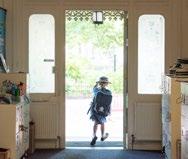
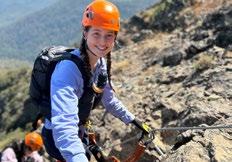
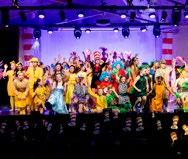
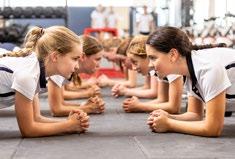
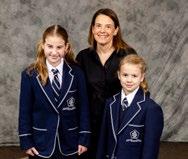
We acknowledge the Traditional Custodians of the Land, the Wurundjeri Woi Wurrung, the Boonwurrung and the Taungurung peoples of the Kulin Nations, whose sovereignty was never ceded, and pay our respects to their Elders, past, present and future, for they hold the memories, traditions, culture and hopes of First Nations Peoples. We also recognise their continuing connection to Country and culture.
We acknowledge that our community is diverse; and Lauriston values an inclusive and accepting environment for all ages, genders, abilities, races, religions, sexualities and cultures.
Cover: Watercolour painting of Blairholme, by Crystal Li – Year 6 WELCOME
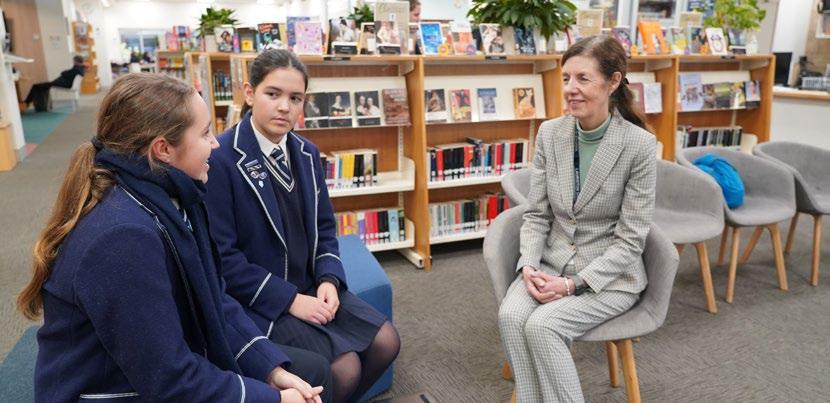
I have been reading and thinking about the impact of COVID-19 on our children and young people. Research is becoming available which attends to the long-term impacts of the pandemic on academic progress and mental health concerns.
In their 2023 study, The impact of COVID-19 on youth mental health: A mixed methods survey, Bell et al. gave attention to the perceived negative and positive impacts of the COVID-19 pandemic on the mental health and wellbeing of young people in Victoria. The study gathered information from 593 young people with and without mental health care needs and the findings showed high levels of clinical depression (48%), anxiety (51%) and loneliness in both groups.
Research over the years has shown that early adulthood is a vulnerable period for emerging mental health disorders and young people experience higher levels of loneliness and social isolation. For this study, the young people were given an online survey between mid-March and mid-May 2020 when there were a variety of COVID-19 restrictions in place.
Five themes captured the negative impacts of the COVID-19 pandemic:
1. Social Isolation | being unable to see friends and being isolated from normal social interactions. The young people had feelings of loneliness and difficulties with motivation as a result.
2. Interpersonal Tension | feeling trapped at home with family or housemates.
Of the positive impact themes that became evident from the study, young people reported that they had more time and there were fewer expectations.
They were better able to control their schedule, stopped wasting time and felt reconnected with hobbies or learning new skills. For some young people, being able to connect with family was a positive and technology enabled them to maintain connections with friends. Time for self-reflection enabled some young people to get to know themselves better and perhaps change perspectives on some topics and situations. Interestingly, some young people felt better able to take care of themselves because they had fewer commitments and expectations.
For those young people who went through the COVID-19 pandemic, the current research would suggest that they will be more likely to experience depression and anxiety along with social and emotional and behavioural challenges.
In October 2023, The Age produced an interesting series of articles about our young people and the impact of the COVID-19 pandemic.
3. Worsening mental health | participants describing symptoms consistent with depression and anxiety, such as low motivation or mood, difficulties concentrating, feelings of hopelessness.
4. Adjusting to lockdowns | subsequent feelings of uncertainty about the future and lacking in motivation.
5. Feelings of time slipping away | not being able to achieve their life goals and challenges in looking after their mental health.
The pandemic and subsequent periods of lockdowns have had particular impacts on social skills such as the ability to interact, cooperate and share which are developed from Prep to Year 3. As children progress into Year 4 and 5 there may be less social awareness and a gap in making social and emotional connections.
A Royal Children’s Hospital survey found that Victorian children during COVID-19 reported less physical activity, less outdoor activity, more recreational screen time and less social connectedness than other Australians. Recreational screen time for children should be no more than 2 hours each day. Research indicates that teaching children ‘prosocial’ behaviour such as acts of kindness before the age of 13 and encouraging them with opportunities to volunteer in civic and social settings will help reduce their odds of having poor mental health by 28%.
Most recent 2023 data continues to show elevated levels of worry in young people. The data also indicates declines in resilience, engagement in school and mood. PostCOVID-19 there has been an increase in non-attendance at school and attention problems and distractibility appear to have increased. While some students thrived during the pandemic and continue to thrive, for some students there is a struggle with finding their sense of direction and sustaining their levels of attention.
• Jane Laidlaw, Operations Director of Enhanced Community Care at Orygen, encourages parents to engage them in activities they enjoy and be aware of changes in eating, sleeping and seeing friends. Such changes may indicate that their son or daughter may need support with their mental health.
• Dr Katherine Dix, Australian Council for Educational Research, encourages parents to engage with the school, attend information sessions and find ways of supporting their children without becoming the ‘helicopter parent’.
• Dr Dix encourages parents to demonstrate trust in their children and provide them with opportunities to make their own decisions.
• Encourage teenagers to participate in physical activities they enjoy.
At Lauriston, our attention since the return of our students to our campus has been on the provision of academic and personal development support. Our teachers in the early
• Professor Kim Cornish of Monash University believes that teaching children what emotions are and what they mean is valuable for wellbeing.
• School-aged children are recommended to do 60 minutes of moderate to vigorous exercise each day. Finding sport and physical activities can lead to better mental health and a lifelong love of being active.
• Outdoor playtime and a variety of physical activities such as bike riding or walking to school is beneficial for positive feelings of wellbeing.
• Children involved in volunteering before the age of 13 reduce their odds of having poor mental health by 28%.
• Primary aged children are recommended to have no more than 2 hours of sedentary recreational screen time a day.
primary years have spent more time establishing social skills and self-awareness both inside and outside of the classroom during the first part of the school year. Our Prep to Year 2 children had disruptions in their attendance at kindergarten, swimming lessons, ballet and music lessons, thus social interaction skills were not as well developed.
We have enhanced the opportunities for our children in the Junior School to participate in a broad range of sport, including team sports, where the skills of cooperation and working as a team member are developed.
Our music program in the Junior School further contributes to our children finding personal interests and learning to work cooperatively.
While our children learn self-regulation and persistence in their classroom, through co-curricular activities such as sport and music, they also learn these skills and can feel satisfaction when they can observe their own progress.
For our students entering the secondary years, we have devoted time to their transition in order to support their connections with the School and their cohort. There are myriad co-curricular activities for our secondary students and physical activity is encouraged for everyone to participate in.
Across the Junior and Senior Schools, the student-teacher relationship and the support staff available to our children and young people are key drivers in fostering motivation, involvement and help-seeking skills when they feel lonely, sad or isolated from their peers.
We are fortunate at Lauriston to consult with Dr Michael Carr-Gregg (BS (Hons), MA, PhD, MAAPI, Certificate Child Internet). We invited Dr Michael Carr-Gregg to make a contribution to this article and he has offered valuable advice for parents of students in our Senior School.
Dr Carr-Gregg points to a recent survey by Mission Australia of over 19000 15 to 19 year olds which found that school challenges in the form of high workload and academic pressure was the biggest personal issue with 37.1% of students being extremely or very concerned. This is the highest percentage since the survey was started in 2002.
Dr Carr-Gregg cites four specific habits that many young people find helpful in the final years of school: sleep, healthy diet, regular exercise and hydration; as well as outlining a number of study habits to support senior school academic endeavours.
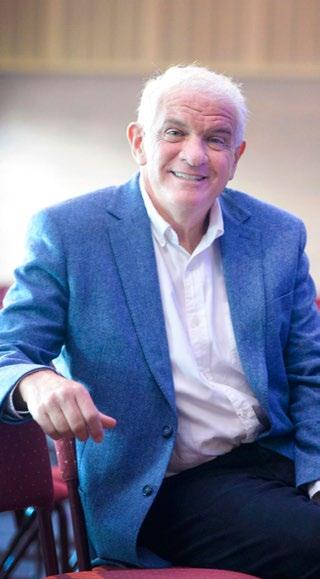
While its importance is often underestimated, sleep plays a vital role in cognitive function and memory consolidation. One study on the sleep patterns of Australian adolescents discovered that around one quarter of teenagers aged 12 to 15 and half of teenagers aged 16 to 17 years are not getting enough sleep on school nights to meet the national sleep guidelines. All students should strive to establish a regular sleep-wake schedule, ensuring they receive the recommended 8-9 hours of sleep each night.
The brain is an energy-intensive organ, using around 20% of the body’s calories, therefore fuel is needed to maintain concentration throughout the day. The Mood Food Centre at Deakin University maintains that eating a nutrient-rich diet reduces the risk of a major depressive disorder.
Eating breakfast before school is helpful and enables better brain function, memory and attention, yet about 20% of teenagers choose to skip this important meal.
A mediterranean diet which is primarily plant-based and emphasizes a daily intake of whole grains, olive oil, fruits, vegetables, beans, nuts, limited dairy products, moderate amounts of fish and poultry and low amounts of red meat has been associated with various mental health benefits.
Physical activity is fundamental to the life of a senior years student with research indicating that physical activity has a positive influence on memory, concentration and classroom behaviours.
Drinking water supports optimal brain function, helping young people to maintain focus and retain information. Having a water bottle during study is of value for students. The Australian Dietary Guidelines (ADG) encourage water as the fluid of choice and suggests about 1.4 to 1.6 litres per day.
Students should be encouraged to regularly review and revise notes, textbooks and assignments during each of their study sessions.
Pomodoro Technique
Our brains are not well designed to remain focused on a single task for a significantly long period of time, with most individuals losing their concentration after 20 minutes.
The Pomodoro Technique is a time management method that involves breaking work into intervals of approximately 25 minutes in length, separated by short breaks.
An intensive 20 to 25 minutes of study is going to be more productive than an unfocused session of two hours. The technique aims to reduce the impact of interruptions on focus and improve productivity.
Structured Study Schedule
A structured study schedule will help students allocate specific time slots for different subjects, ensuring they maintain a balanced approach to their studies. Establishing such a routine creates a sense of purpose and discipline.
Using a weekly planner or calendar app helps to create a manageable timetable with sufficient time to cover all subject disciplines. Students should also block out some hours which can be used for revision and the completion of past examination papers. Regular breaks also need to be scheduled in.
Encouraging students to actively engage with the material presented to them by teachers rather than passively consuming information is important. There is no single and correct way to study. For some students who learn visually, diagrams, mind maps, picture aids and dot points will be of value. Some students prefer to read and take notes, or will rewrite class notes in their own words and utilize questions as their headings. Auditory learners will listen to voice recordings they have created for themselves.
Parents can help their children by encouraging them to take notes, summarise key points or teach concepts to others. Students can create their own flashcard sets using an app like Quizlet or Brainscape.
Both are of value to students, so they become familiar with examination papers and experiencing examination conditions.
Study groups can help students to learn and gain new perspectives and support a better understanding of the material. Sharing the study load and receiving support from group members can help to reduce anxiety related to tests and examinations.
While academic studies are important, a well-rounded life, which includes physical activity, hobbies and social connections, will foster a positive mindset, reduce stress and contribute to overall wellbeing.
While some children and young people were able to thrive during the lockdowns, others became more vulnerable to feelings of uncertainty about how to interact with their peers or what their future would be like. While some young people were able to ‘bounce back’ and regain their hopefulness about achieving future goals, for others, there has been a loss of motivation and a feeling of not being able to achieve life goals.
As educators and parents, we play an important role in observing our children and young people, acknowledging that each individual has come through our Post-COVID community with different learning and wellbeing needs. Through working in partnership, we can provide the enriching environment and personal support needed to help our young people to thrive.

Principal
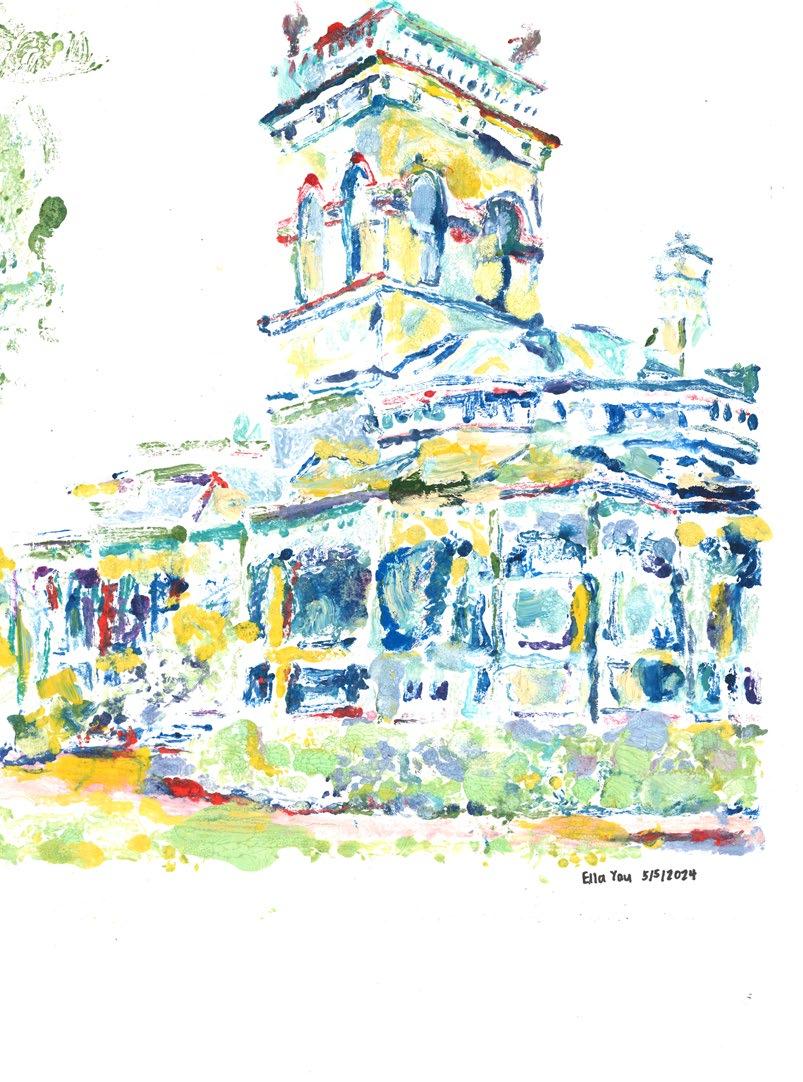
There is much excitement and anticipation about the imminent re-opening of Lauriston’s beloved Blairholme.
Blairholme, a substantially historical building in Lauriston’s story, was acquired from the Mildred Family in 1975. The process of transforming the space began in 2016 as part of Lauriston’s 10-year Master Plan.
As a heritage-listed site, much importance was placed on ensuring elements of the property were protected, including a mature camphor laurel tree. Principal Susan Just explains,
“Blairholme holds many special memories for our past students and their families and its importance as a place of learning and flourishing for children needed to be maintained. Working with our architects, we wanted to give attention to important tenets of the Reggia Emelia Approach.”
Fiona Ireland, Director of Kindergarten, shares that along with the children and staff, the Reggio Emelia philosophy has also made the move to Blairholme.
“It’s obvious in the building design that it matches the strong image of the child and the environment as the third teacher. The staffroom is also a beautiful space, and all the staff feel very valued. What I love about the new Blairholme is the calm aura the design creates, as the rooms are very light and airy, while still providing a warm and inclusive environment for the Lauriston community.”Fiona Ireland, Director of Kindergarten
The success of Blairholme’s incredible makeover is due to a dedicated and talented team: lead architect Richard Stafford, Managing Director at DesignInc worked alongside lead landscape architect Josh Chia, Associate Director at ACLA.
One of the design choices that makes Blairholme stand out is the amount of natural light within the rooms. Richard and his team installed skylights in rooms to give children the chance to look up into the sky and admire the beautiful landscape. Another key component is the use of texture and colour:
“The muted colour palette means you don’t get overwhelmingly bright colours, which can sometimes confine the learning experience. The educators and the children can build the space and create their own adventure in a way, so the space gives them a lot of flexibility.”
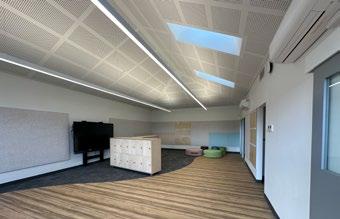
Working with Fiona and the School, Richard also ensured the centre would be a safe and soothing space.
“The timber we used creates great acoustics and reverberation which helps the space sound calm. There are little breakout spaces: little sensory nooks that act as little quiet areas, as early learning has a range of different personalities. Some kids like to be more active, whereas some will be a bit quieter and go into those sensory spaces,” he explained.
The transition between the inside and outside of the centre is seamless, which continues to support the Reggio Amelia Approach of extending the learning environment outdoors. Additionally, the outdoor area pays homage to the unique elements of a Lauriston education.
“The large theme in the whole landscape redevelopment is for nature-based play to be a mini-Howqua experience. We wanted to achieve a consistent look and feel from Blairholme to the main campus,” –Josh Chia, Associate Director and lead landscape architect.
Another important consideration that follows on from the indoor design is that the outdoor space invites a student’s autonomy, as well as opportunities for social play.
“I think the new sandpit and waterplay area is going to be a fantastic space for the children to interact, because with these elements you have loose parts play and it provides the framework for kids to interact together,” Josh said.
On behalf of Lauriston, we express our heartfelt gratitude to everyone who was involved in the project. Redesigning Blairholme was an extremely exciting journey, and it will be incredibly rewarding to see our youngest learners exploring and finding belonging in their new home.
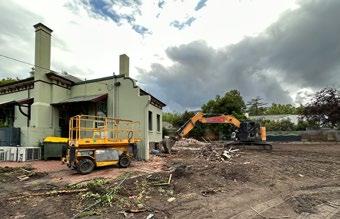
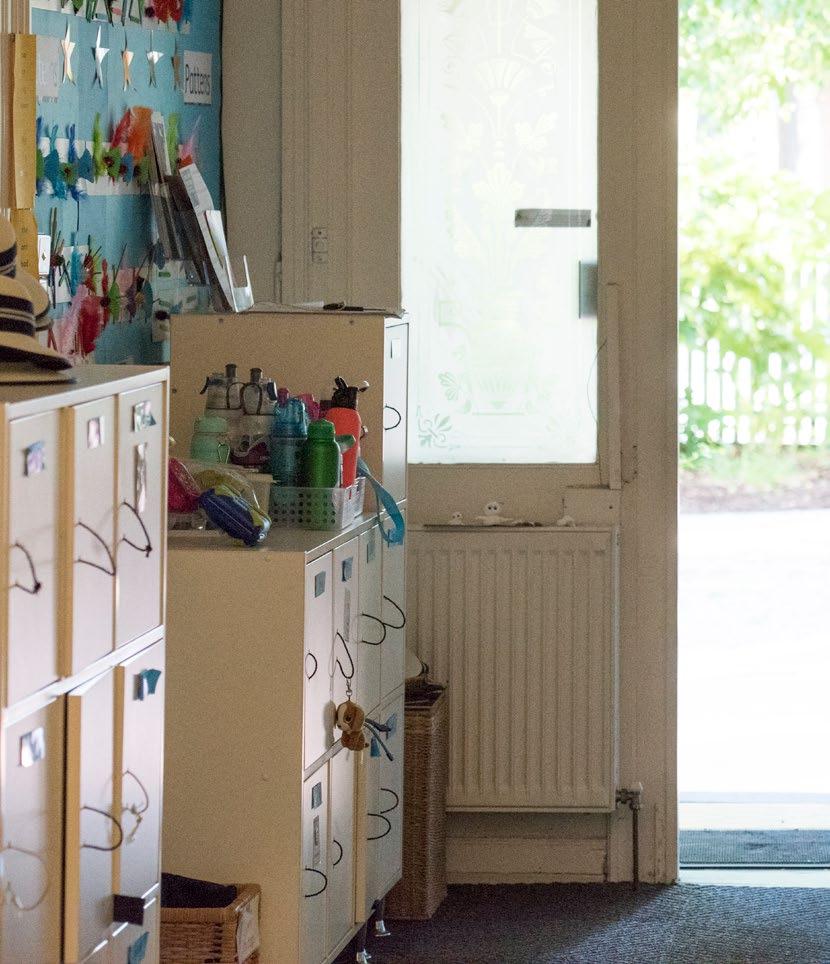
became Lauriston’s Early
Centre (ELC), it was a truly magical place for our Prep to Year 2 students.
Our students have many wonderful and nostalgic memories of their time at Blairholme, as Blairholme marked the very start of their primary education and the many friendships they would make along the way.
“In Blairholme I remember on the Tiger Turf, the blocks that we used to make things. There were a few that were perfect for recreating a seesaw to play on.” – Sadie, Year 6
“Some of my favourite memories of Blairholme were made in the famous Fairy Garden. I vividly remember the simple joy of pretend play with my friends like creating a ‘mini spa’ where tree leaves made face masks and crushed up flowers made for nail polish. One of my favourite things to do was to make tiny items for the fairies that lived in the garden, because it made me feel I was doing a good deed. That garden was truly magical.” – Isabelle, Year 6
“One of my favourite memories of Blairholme would have to be the Spring Market. It was so fulfilling selling the creations we had made, and I also loved the responsibility of managing money.” - Elke, Year 8
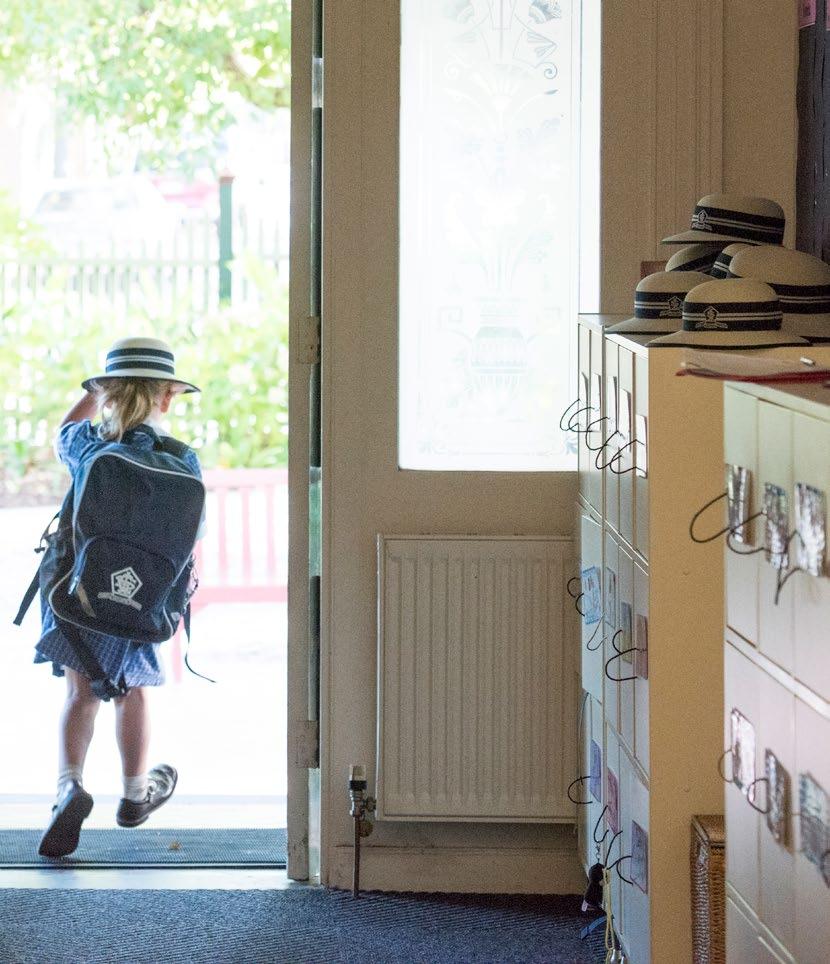
“My favourite part of Blairholme was the Blairholme Market. I loved walking through all the different classrooms, seeing the little stalls with lots of different items and creations made by all of us. It was always fun creating these and looking at what other people came up with. However, the best part was when someone else walked up to your stall and bought one of your creations that you made and seeing the joy on their faces when they bought it and walked away to have fun with it.” – Alexandra, Year 6
“I loved playing with buddies making fairy houses with my friends! And especially the Blairholme Market” – Claire, Year 3
“At recess and lunch, we used to play giant games of tag all together, and it was really fun catching and running from my friends. There was a ‘secret passage’ that we used to use as a hiding spot, right next to the big deck where the sandpit was.
Although it was a good hiding spot, the taggers soon realised that everyone would just go and hide there, so they would come from each side of the passage, and tag everyone! It was always really fun sprinting through the passage and jumping down on the other side, trying not to get caught by the tagger.” – Eva, Year 6
“One of my favourite Blairholme memories is learning to read with my Prep teacher Ms Walter. I loved having my very own reading wallet full of books to enjoy, and the opportunity to read in the big room with the mums who volunteered each week. I am sure my love of reading stems from this time.” – Claudia, Year 6
“The fun things I like to do at Blairholme is in the playground playing with blocks and footy day was really fun. I also enjoyed the fairy garden” – Leiya, Year 3
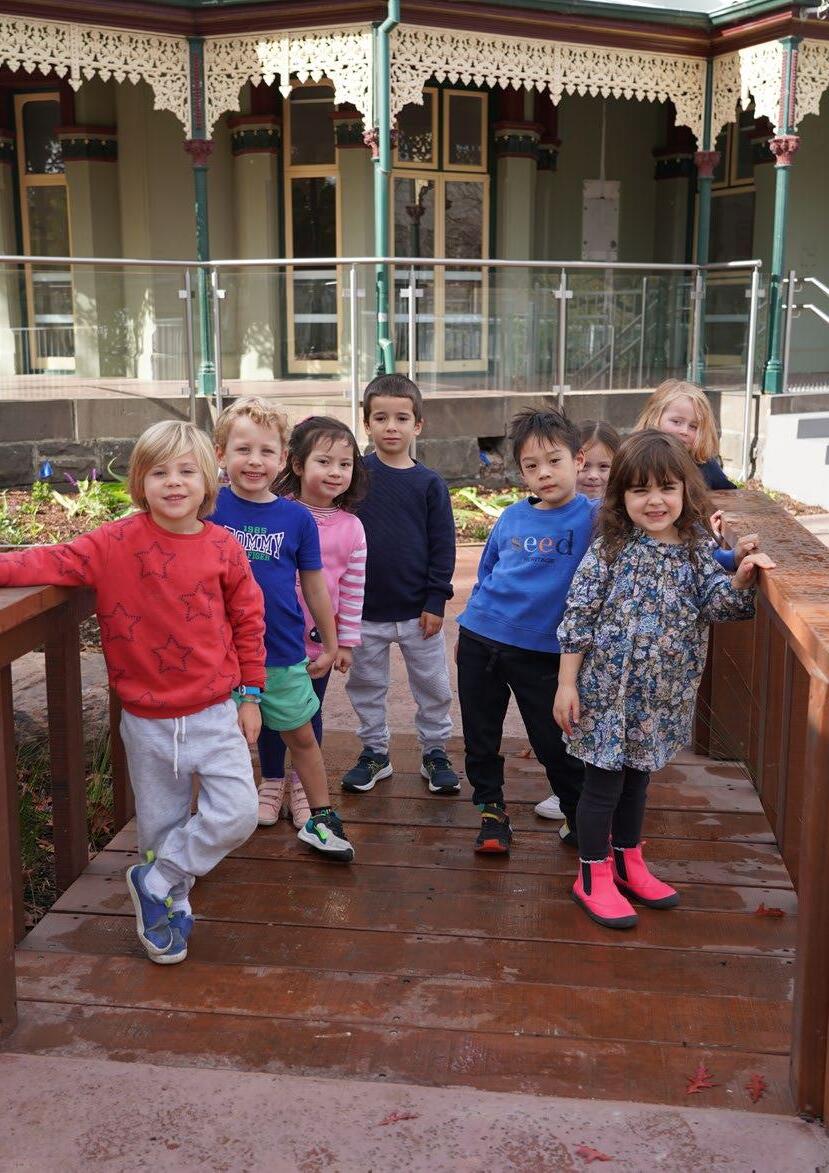
The key to a sense of belonging is the building of relationships. As children begin a new year of kindergarten, teachers build trust with children through active listening, empathy and respect for their feelings and opinions. When families support children as they enter the classroom, and participate alongside them during significant events, it assists children in feeling valued and gives children a powerful sense of belonging within the kindergarten community.
Children who know they are part of a caring community feel safe, secure and comfortable, which is essential for healthy brain development. This security allows children to explore the environment and engage within it with confidence.
Children also build a sense of belonging to a particular place. This is a fundamental component of how children understand who they are. The sense of place in childhood both affects children’s current quality of life and frames their lasting world view.
Research informs us that children’s cognitive development is closely related to their place attachment, and that children’s adaptation to a new environment depends on how such place attachment is created. Children’s identity is an accumulation of their experience of place. The physical space needs to be welcoming and culturally inviting, a place where children can make choices, explore freely, have their needs met and begin to understand themselves.
As our new ELC nears completion, the educators reflected on how they could understand and determine the best way to support the children as they leave a familiar happy place, full of memories and move to a different environment. Together, in this different place we will need to find a new identity and a new sense of belonging and build the community within the space.
The new Blairholme ELC has its own history and identity. It was acquired by Lauriston in the 1970s and has been a place where young children have learned, played, developed and felt a strong sense of connection. Now, it is the turn of the Kindergarten children to create their memories and find a sense of identity within the new building and build a new sense of belonging.
The philosophy of Reggio Emilia required that we use the voices of the children in our reflections as we planned for the move to the new ELC. The children were consulted and invited to share their ideas, opinions and feelings about what they may expect. The conversations were positive, and the children were excited to explore new environments, encounter challenges and build a different sense of place.
Question: What do you think we mean by the word ‘belonging’?
Eddie: You belong to someone.
Rose: Like this School, belonging to somebody.
Lola: Belonging to someone we don’t know.
Holly: Like the Kookaburra room belonging to Amanda and Adriana.
Freddie: Belonging to somebody that takes care of it.
Teddy: Belonging is you and the people.
Isabel: You feel happy to belong.
Clementine: It feels good, we get to share ‘stuff’.
Following on from these discussions, the groups of children walked down Malvern Road to see what their new building looked like. Many of the children were already familiar with it as parents had driven them by to see the development. This was exciting; the children spotted items in the playground: a slide, a sandpit, places to hide and a huge chair, what was it for? Could they play on it?
As the children await the move into Blairholme, the conversations and visits we have had prior, are not only increasing their anticipation, but also the sense of belonging they will feel in this magical new space.
Fiona Ireland Director of Kindergarten
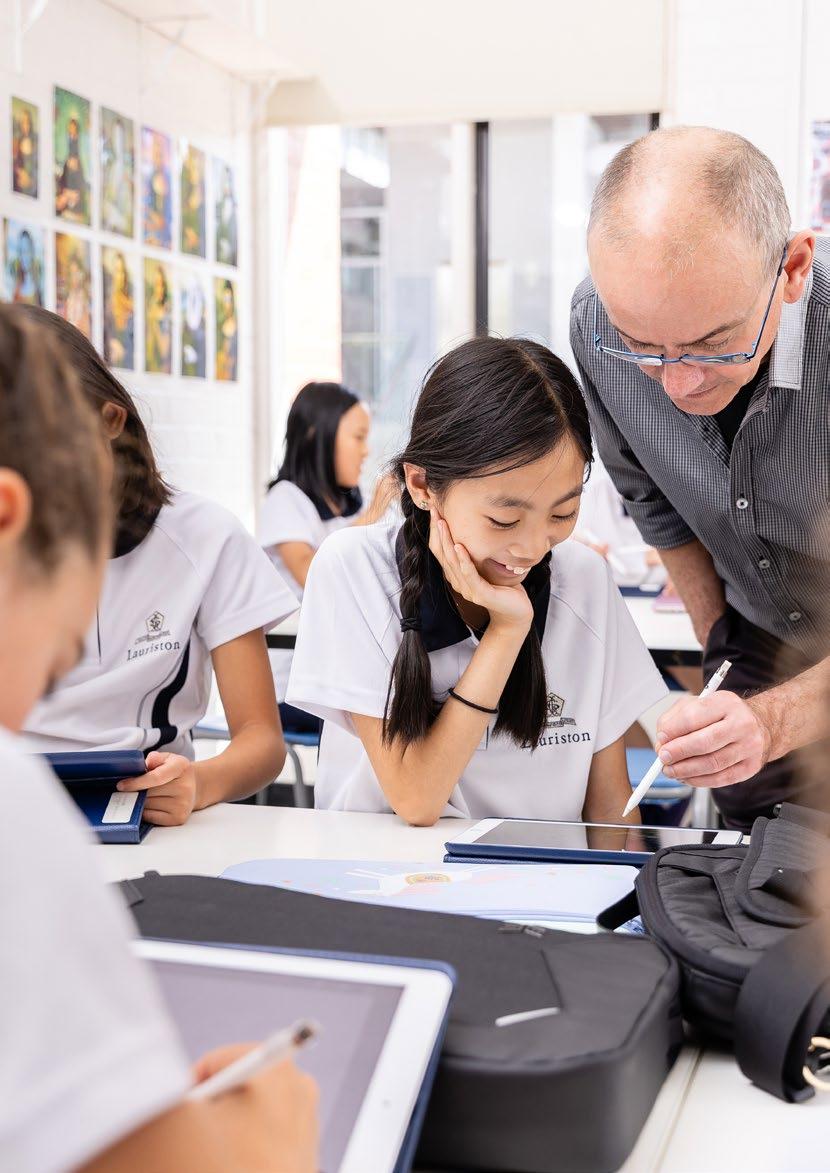
Empowering Junior School students: nurturing digital citizenship and cyber safety
The purpose of Information and Communication Technologies (ICTs) at Lauriston is to enhance student learning. The use of ICTs within school should be responsible, legal, appropriate and for educational purposes. We aspire to create and maintain a cyber-safety culture that aligns with our School values and with legislative and professional obligations.
At Lauriston, we acknowledge that from a noticeably young age, children interact via technology to learn, connect, create and communicate. It is undeniable that the age when children first go online is becoming younger and younger. As a result, we feel it is vital that they possess the skills and knowledge to operate in this digital world. In the Junior School, we have developed a sequential Digital Citizenship program.
Twenty-first century students spend increasing amounts of time online learning and socialising. eSafety’s Mind the Gap Report of 2022 showed that digital engagement has increased, with 78% of children using the internet for schoolwork in 2016, compared to 96% of children in 2021. These online communities require cybercitizens who behave respectfully and safely online. Technology continues to evolve at an unprecedented pace, so it is vital that we provide our children with the skills to navigate their digital world.
Throughout their middle-primary and upper-primary years, our Junior School students learn that responsible digital citizens engage positively on the internet. Positive online behaviour includes behaving thoughtfully, ethically and respectfully, with anti-social behaviour, such as cyberbullying and trolling, being actively discouraged. The students learn about their online world – their rights and responsibilities, opportunities and challenges, risks and remedies as well as acquiring the skills needed to read and interpret the vast amount of information that is so readily available online. The students learn how to create strong passwords by including upper and lower-case letters, numbers and symbols. They are introduced to the acronym ‘think’ before you post.

Safe and ethical behaviour online is explicitly taught throughout our Junior School curriculum and parents are encouraged to closely monitor their child’s internet and social media use at home. At School, the internet is used to support teaching and learning. However, at home it is often used differently. Not only is it a study resource for students, but it is increasingly used as a social space to meet, play and chat. Children are using the internet to express themselves and to experiment anonymously with different identities.
Bullying, stranger danger and gossip have long been issues for young people growing up. These are all behaviours which now present online. Our students need parental guidance on how to conduct themselves safely and appropriately online.
It goes without saying that young adolescents can often act impulsively. This lack of impulse control combined with online anonymity could lead young people toward dangerous behaviours online: cyberbullying, inappropriate photo or video uploads, illegal downloads and accessing inappropriate material. We recommend that parents be aware of what their children are accessing online to make sure they are behaving respectfully and responsibly. It is important that parents talk to their children about what’s appropriate to say to others, what kind of content is appropriate to upload and download, and what kinds of interactions are important to avoid.
Helping your children become responsible digital citizens is what will help keep them safe online.
Principles of digital citizenship align with the values of belonging and connectedness. When students exhibit positive online behaviours, such as being responsible, kind and respectful, they contribute to the creation of safe and welcoming online environments. This, in turn, enhances feelings of belonging and connectedness within our Lauriston community where everyone feels accepted and valued.
Chris Toms Vice-Principal, Head of Junior School
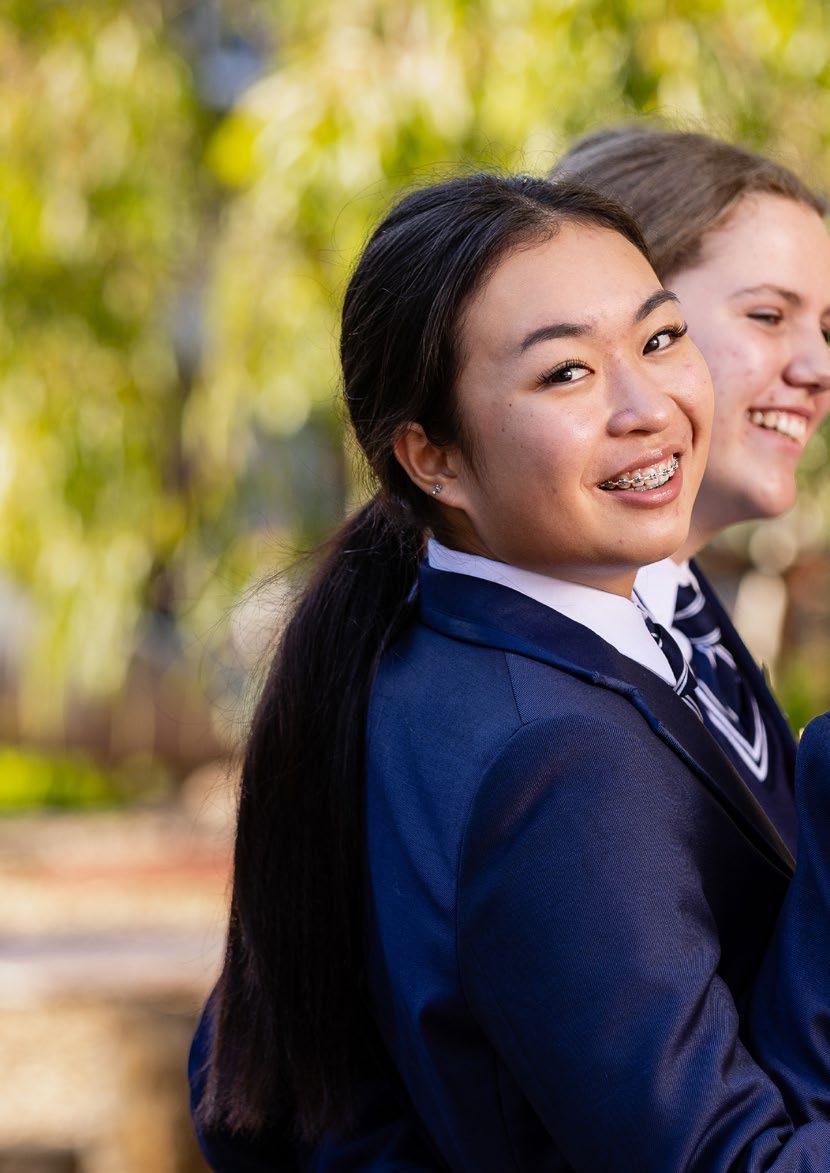
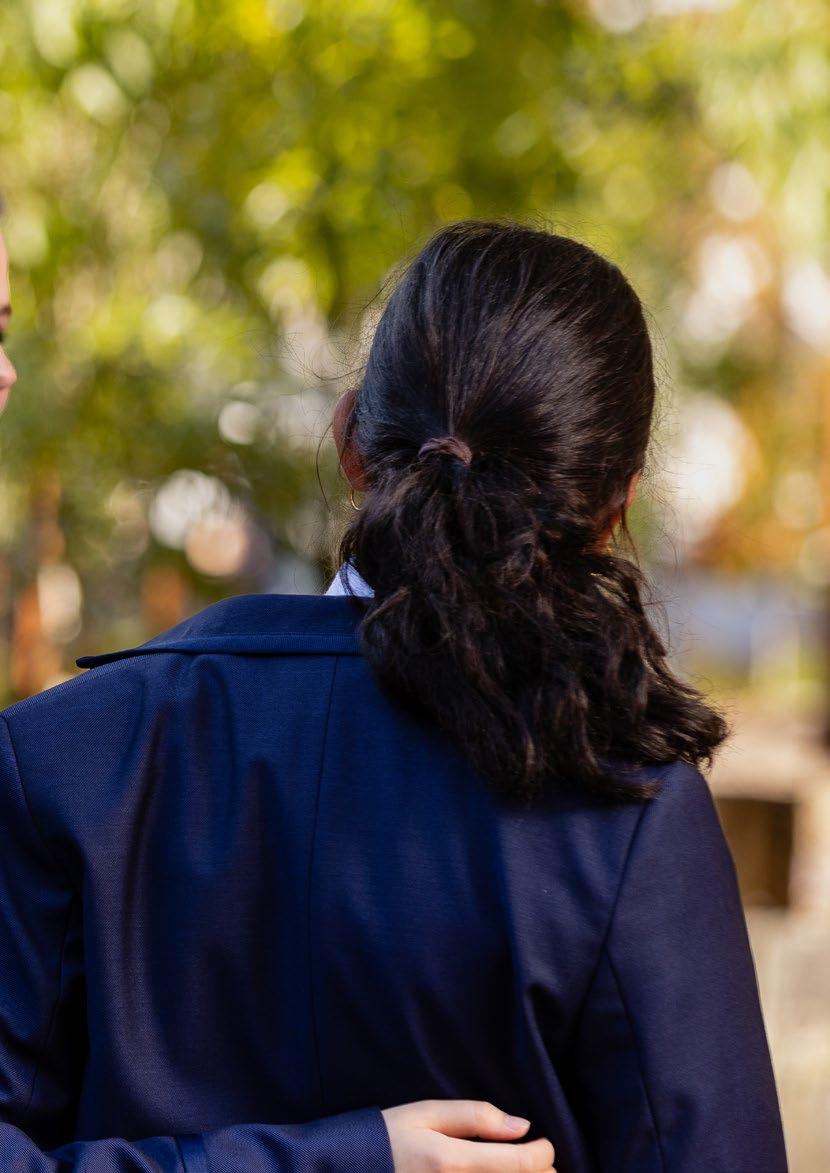
One of Lauriston’s core values is Relationships. Through this value, we foster a culture of optimism, collaboration and celebration. Our goal is to communicate openly, honestly and respectfully, allowing us to have meaningful connections with each other in the community and beyond.
Often people ask what enables Lauriston Girls’ School to have established such a distinctive and positive learning environment and what factors influence our significantly high academic standards and results. Academic staff, past and current students would agree that the focus we have on building quality relationships with and amongst our learners is one of the most influential factors to our success and underpins why our learning environment is so unique and special.
At Lauriston we know that quality relationships between teachers, students and the wider community have a positive impact on student wellbeing. Recent Australian Educational Research Organisation (AERO) research analysis shows a direct correlation between quality interactions with peers at schools and improved academic results in test scores (Pivot, 2023).
In 2023, the Victorian Department of Education defined seven High Impact Wellbeing Strategies (HIWS) that sit alongside the High Impact Teaching Strategies (HITS) which drive the development of a high-performing and successful school culture. Understandably, HITS include structured lessons, explicit teaching, collaborative learning, and high expectations, all of which align with Lauriston’s teaching and learning framework.
For these strategies to be further enhanced, we can integrate them with HIWS, which promote wellbeing strategies including:
• building quality relationships with students
• facilitating peer relationships
• supporting inclusion and belonging
• fostering student self-efficacy.
Research suggests that students are “more likely to feel comfortable and engaged in learning when their teacher is welcoming, interested, encouraging, caring and kind” (AERO, 2023). Teachers can “also cultivate relationships by noticing student effort and responding positively when they struggle, helping students see that they can be successful and praising them, so they feel their effort was worth it” (AERO, 2023).
Teachers at Lauriston prioritise building relationships with their students. Teachers get to know their students both through learning and wellbeing conversations
and informal chats. On any given day in and outside the classroom, positive interactions with teachers and students happen. For example, walking through the courtyard or library at lunchtime you will observe this at work; staff and students are meeting for individualised student support. Teachers foster self-efficacy by encouraging students to persist, providing quality feedback and having high expectations.
Positive teacher–student relationships allow teachers to intervene at the point of need, in a timely and efficient manner, to assist students in their learning and/or behavioural challenges (AERO, 2023).
Focusing on connections and care for students, and prioritising relationships allows teachers to build credibility and trust, with flow-on effects to greater student effort and productivity in the classroom environment (AERO, 2023).
A sense of belonging and connection at school translates into lower absenteeism, higher levels of effort, interest, motivation and an enjoyment of challenging learning opportunities. In other words, when students feel connected and valued in their learning environment, they are more likely to thrive academically and socially.
Walking through the grounds or standing at the front gate, students and teachers warmly greet each other. This may seem insignificant; however, this behaviour underpins teacher approachability and the power of our focus on relationship building.
Vanessa McDonnell Head of Senior School
References
AERO (Australian Education Research Organisation). (2023) Positive teacher–student relationships. https://www.edresearch.edu.au/sites/default/ files/2023-12/positive-teacher%E2%80%93student-relationships-aa.pdf
Pivot Professional Learning. (15 June 2023) The importance of student belonging and connectedness [Blog post]. https://www.pivotpl.com/post/theimportance-of-student-belonging-and-connectedness
Department of Education. (2023) Quick guide to the Victorian teaching and learning model 2023. Victoria State Government. https://www.education.vic. gov.au/Documents/school/teachers/teachingresources/practice/Quick_Guide_ to_the_VTLM-Aug-2023.pdf
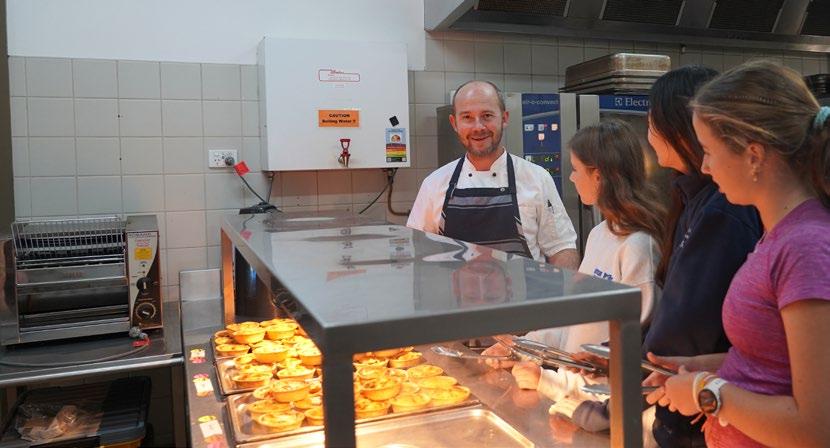
We sat down with much-loved Howqua Chef, Mr Tom “Tommy D” Dunlop, to get his perspective on the role of the dining hall and nutrition at our Year 9 campus.
How do you see the students change over the course of the year?
Everyone says it, and it’s true – they change dramatically. Coming out here away from their family home and living in essentially a little share house - most people don’t get exposed to that experience until university, or even later in their 20’s.
They’re starting to become a little more self-aligned and capable and confident in their own abilities to manage their own world. It’s also the realisation that they’re part of a little community, all in it together.
What are some of the challenges and strategies you work with, when thinking about the Howqua program?
The biggest challenge is more awareness of intolerances, which we need to balance with greater proteins that are shelf-stable, when on Outdoor Program (OP). We often have a high number of students who don’t eat seafood, which was a challenge when our only animal-based protein on OP was sachets of tuna! I’ve been able to source some alternatives like salamis and beef jerky, which gives the students options.
We understand your connection to Howqua goes beyond the dining hall – what else are you involved in and why?
I’m involved in the Mt Buller ski program, which starts with a day of downhill and then a day of cross-country, aiming to get the students to a standard so they’re eventually able to ski out from camp. It builds up to overnight cross-country ski trips at the end of term. I grew up in Merrijig, so I’m quite proud of Mount Buller – I like showing new runs to students who might be familiar with the mountain, and of course trying to convince the ones from Hotham that there is some really good skiing on Buller, though I’m rarely successful!
What single piece of advice would you give a family nervous about attending Howqua?
We do our absolute best to accommodate all in the kitchen. I try and get as many people exposed to new foods, and I think food is one of those things that can really be a maker and breaker. We do everything we can in the kitchen to make sure students are getting what they need to thrive throughout the rest of the program.
What does the dining hall represent to students?
I like to imagine that it is the most important place on the whole campus - an army marches on its stomach. I think mealtimes are a pretty special occasion - it’s one of the few times that they get to come together, like a giant family meal. For the rest of the day, they’re broken up into little groups and classes, and this is the one point where everyone gathers at once. The family comes back together.
Dr. Manson was always generous in giving her valuable time to others, whether it be wise words for a student navigating their mid-teenage years or a staff member seeking career or wellbeing advice for themselves or a chat about the activities of the recent term break. Much of what Dr. Manson undertook, she did so with a straightforward and thoughtful manner. Additionally, and a credit to her efforts, never once did Dr. Manson excuse herself under the guise of “Sorry, I’m too busy.”
Arriving from Hobart, she brought not only her family but a sense of calm, a love of the outdoors and fitness, a kindness that has been appreciated by both students and staff alike and for our students, the perfect role model.
Our students have witnessed a leader who consistently put their wellbeing at the forefront of everything they undertook as they embarked on their Howqua year.
It has been fantastic to share time with her family Sam, Estella and Isabelle around the Dining Hall table. We thank Sam particularly for his generosity in undertaking evening duties, days in the classroom and guiding our students in our Community Service program. Dr. Manson and her family have certainly become part of both the Howqua and wider Lauriston family and as they return to Hobart, we hope that they reflect on the many good friends and fond memories they made whilst at Howqua and in the wider Mansfield community.
Dear Dr Manson,
We, the 2023 cohort would like to wish you a warm farewell, and the best in all your future endeavours. Our time at Howqua wouldn’t have been the same without your presence. We were so lucky to have had you as Head of Campus, providing us with the guidance and wisdom that we required to get through the year.
We loved it when you popped into our houses, and the sense of humour that you brought to the campus cannot be replaced. A fond memory that we’ll never forget was when we got to play soccer with you in the staff and students’ game, and the various other times when you shared your stories and experiences.
Thank you for encouraging us around the runs and always looking after us in times of need.
You were always there to inspire, encourage and motivate us to get up those never-ending hills. Without your support we wouldn’t have made it up to the summit of lone pine, or truly made the most of our year.
You will be deeply missed by all of us.
Lots of love,
The 2023 Howqua Girls
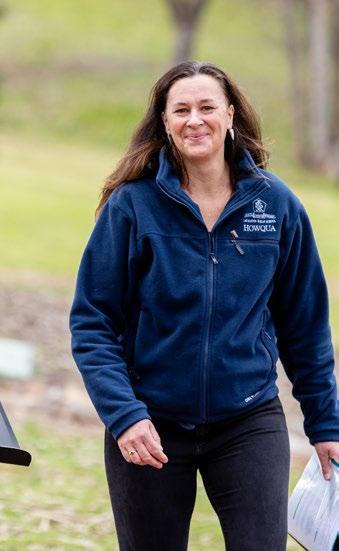
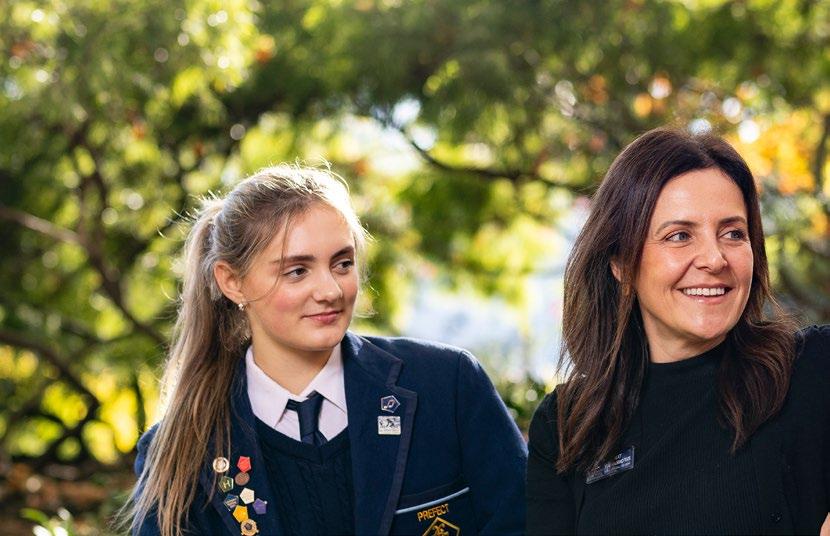
What truly lies at the heart of education? What is the true purpose of schooling? These questions prompt us to consider the essential capabilities we want our young people to develop – the knowledge and skills that will enable them, our communities and the planet to thrive.
While teaching and learning remain the core business for schools, today’s volatile, uncertain, complex, ambiguous, and hyperconnected (VUCAH) world pushes us to extend education beyond traditional boundaries, focusing on wellbeing and the development of social and emotional capabilities alongside academics. According to the Organisation for Economic Co-Operation and Development’s (OECD) aspirational vision for global education – its Learning Compass 2030 – wellbeing must be a fundamental destination and outcome of education.
Research indicates that students with well-developed social and emotional skills are better equipped to manage themselves, collaborate with others, demonstrate empathy, set goals, make responsible and caring decisions, and resolve conflicts. They tend to feel more positive about themselves and the world around them and demonstrate greater leadership capabilities (ACARA, n.d.). Additionally, these skills act as important protective
factors against mental health risks and are associated with improved school attendance, engagement, academic performance, and outcomes (CASEL, n.d.).
The World Economic Forum’s Future of Jobs Report 2020, which maps the jobs and skills of the future, highlights the increasing demand for skills like critical thinking, creativity, problem-solving, self-management, stress tolerance, resilience, collaboration and flexibility –competencies essential for navigating a rapidly changing professional landscape and career advancement.
As we can see, we have a compelling ‘why’ for wellbeing.
In line with the growing body of evidence and advocacy from subject matter experts, respected researcher and psychologist Dr Susan David also champions the development of social and emotional capabilities. She challenges the use of the term ‘soft skills’ to describe these competencies, suggesting we acknowledge them as essential human capacities instead. At Lauriston, we agree.
We believe that unlocking a student’s potential involves more than just academics; it requires a holistic approach to education. This is why we not only teach social and emotional skills explicitly, but also model them and integrate them into the learning experience. Just as literacy and numeracy can be taught, so can skills for wellbeing.
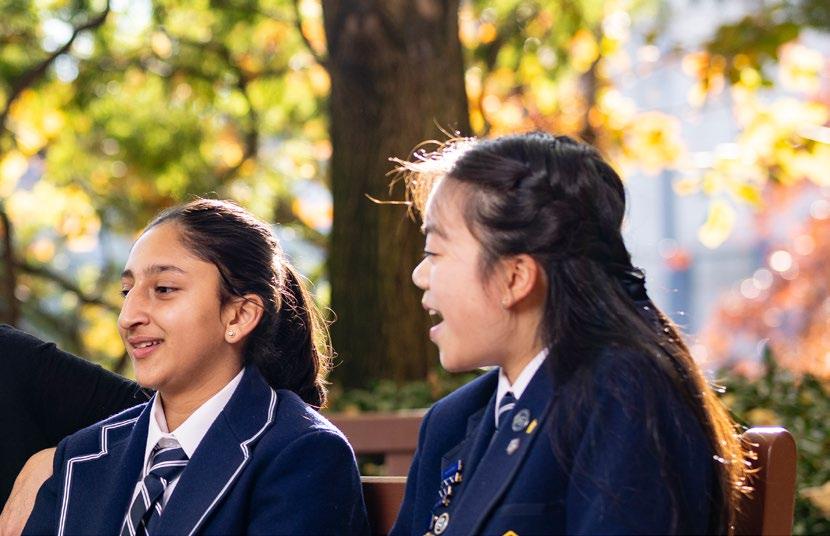
At Lauriston, we foster social and emotional capabilities through:
• a developmentally appropriate wellbeing curriculum
• a teaching and learning model that emphasises inclusion, connectedness and support
• encouraging students to set and work toward personal and learning goals
• providing avenues to amplify student voice, agency and leadership
• supporting all students through our pastoral leaders, practices and academic care network
• building community through our House system, co-curricular offerings and peer-to-peer mentoring
• prioritising restorative practices when responding to unexpected behaviours
• strengthening connections with key attributes within the IB Learner Profile.
Considering that our students spend a significant portion of their formative years in school, it makes sense to nurture social and emotional capabilities alongside academics. By doing so, we ensure that our young people acquire not only technical knowledge and skills but also develop the ability to apply these skills effectively across different contexts and relationships.
As the National Commission on Social, Emotional, and Academic Development (NCSEAD) states: “The promotion of social, emotional, and academic learning is not a shifting educational fad; it is the substance of education itself. It is not a distraction from the ‘real work’ of math and English instruction; it is how instruction can succeed” (The Aspen Institute, 2019).
At Lauriston, we are dedicated to creating a learning environment where every student can thrive academically, socially and emotionally, ensuring success now and in the future.
Nat Fanariotis Deputy Principal – Wellbeing
References
ACARA (Australian Curriculum, Assessment and Reporting Authority). (n.d.) General capabilities. https://www.australiancurriculum.edu.au/f-10curriculum/general-capabilities/
CASEL (Collaborative for Academic, Social, and Emotional Learning). (n.d.) What is SEL? https://casel.org/what-is-sel/
OECD (Organisation for Economic Co-operation and Development). (2023) Learning compass 2030. https://www.oecd.org/education/2030-project/ teaching-and-learning/learning/core-foundations/
The Aspen Institute. (2019) From a nation at risk to a nation at hope. NCSEAD (National Commission on Social, Emotional, and Academic Development). https://files.eric.ed.gov/fulltext/ED606337.pdf
World Economic Forum. (2020) The future of jobs report 2020. https://www. weforum.org/reports/the-future-of-jobs-report-2020
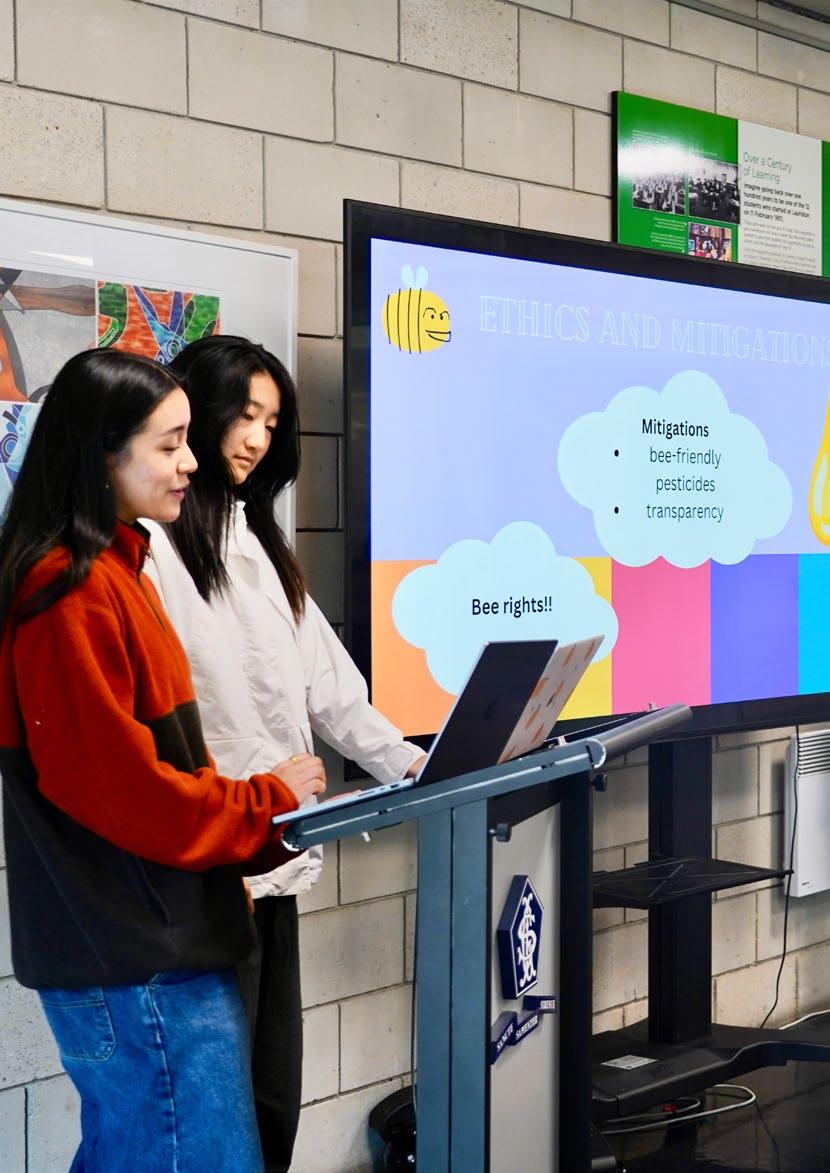
Generative Artificial Intelligence (Gen AI) is undoubtedly something you have heard a lot about in the past 18 months, with platforms like ChatGPT achieving some of the quickest technological adoption rates ever seen. While there has been a lot of discussion about this technology, it is important to understand that this is an iteration of something many of us use daily, whether we realise it or not. Recommendations on streaming services, voice-activated devices, ride-sharing apps and daily internet searches all rely on AI in some way.
When Gen AI took off in 2022, naturally questions were raised about what this would mean for education. “How would it be used in the classroom?” “How will this impact our teachers?” All of which were valid questions. However, we’ve since learned that when used responsibly and ethically, Gen AI programs hold exponential benefits for students, schools and the wider community. Richard Baldwin’s statement to the World Economic Forum’s Growth Summit in 2023 rings true: “AI won’t take your job. It’s someone using AI that will take your job.”
As Gen AI continues to evolve and shape our future, we want our students to be equipped with as much knowledge as possible as they move forward in their schooling and well into their careers. Lauriston students have the opportunity to use these tools as part of their education. However, it is imperative that they are given the opportunity to also understand and demystify this developing area.
During the Term 1 holidays, Lauriston offered an inperson project-based artificial intelligence program through Inspirit AI, an education program developed and taught by Stanford and MIT graduates. Students from Lauriston and neighbouring girls’ schools from Years 6 to 12 had the opportunity to learn from experts in the field about fundamental concepts of AI and machine learning, gaining a deeper understanding of how AI is used to build ChatGPT, fight the COVID-19 pandemic, power selfdriving cars, and more. Students also learned how to train AI models, discuss ethics and bias within AI, and complete a group project applying AI to disciplines like healthcare, astronomy, finance and others.
Speaking to Year 12 student and Lauriston Co-Captain Alison, she says the workshop was helpful in discovering ways to use AI tools and the importance of being educated on its potential.
“As someone who really values creativity, there is a lot that AI can offer in turning a prompt into a reality or helping visualise new ideas. It’s important to have a really balanced perspective because there are a lot of good things about AI including boosting creativity and moving forward in different fields like medicine, but also, there are possible risks. When we go into the real world and AI becomes even more prominent than it already is, we’ll be equipped with a holistic view,” Alison - Lauriston Co-Captain
As for the future of AI in education, Udgam Goyal from Inspirit AI shares his insight into how AI will affect learning in the short term and long term.
“I think in the short term, AI increases the avenues by which you can educate a student. Traditionally, when engaging students in content, it has been very textdriven across the entire world, but now with AI you can use images and construct stories and narratives in novel ways and be creative in engaging students. In the long term, it’s going to solve innate equity gaps in education across the world and allow all young students to unleash their potential.”
Lauriston offers programs like this to our students because it’s important that they know how to use the tools ethically and in their daily lives, and also how to control them. In the Inspirit AI program, students not only had the opportunity to learn how to be consumers of this technology, but also how to really harness and drive the tools.
AI is a tool that our students use, but it’s also a tool that our students know how to use effectively, ethically and in various applications. Our hope is that students understand how to use it as a study tool, to learn new things, and to develop new skills.
Craig Nicholls Head of Digital Learning
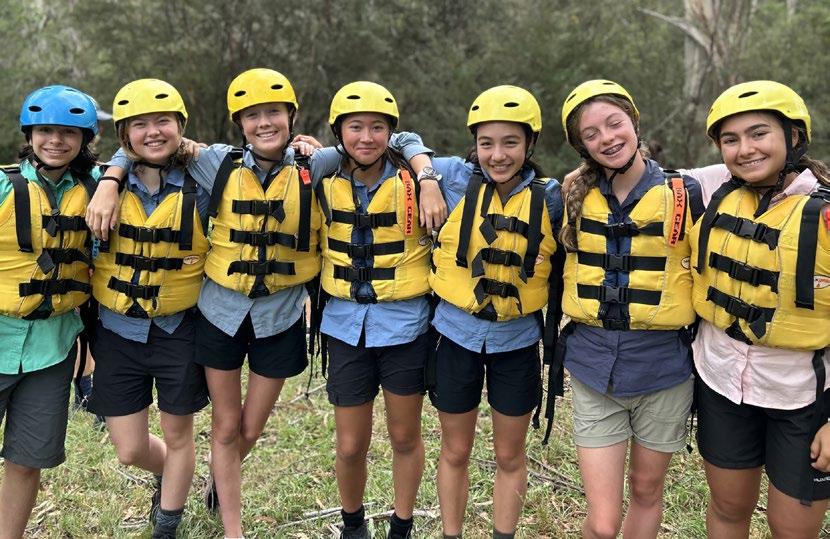
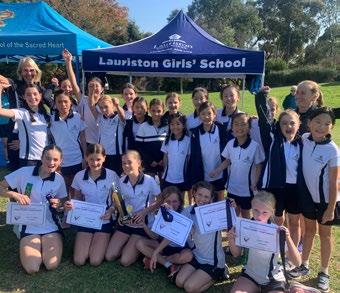
The supportive cheers and house chants threatened to lift the roof off the Melbourne Aquatic Centre at the 2024 House Swimming and Diving Carnival.
With nearly 80 events it was a jam-packed schedule.
There could only be one winner and this year it was Irving House!
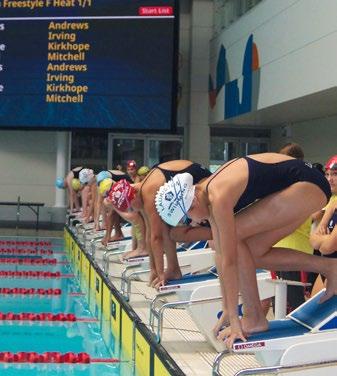
For the first time in 20 years, Lauriston won the Junior School District Cross Country Championship.
The team consisted of 27 students from Years 3 to 6.
All students demonstrated great team spirit, individual determination and resilience.
Go Laurie!
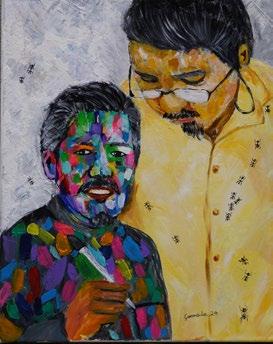
This annual competition has two criteria – you must be between five and 18 years of age and you must paint a self-portrait or a portrait of someone who is special to you.
The quality of the entries is always exceptional, and this year was no different.
We congratulate the winners in each age group:
5–8 Years | Abbey, Year 3, My Grandma’s Magic 9–12 Years | Elaine, Year 5, My Friend Mia 13–15 Years | Tian (Arial), Year 10, Luminous 16–18 Years | Lingzi, Year 11, Portrait of a Friend
People’s Choice winner: Gemma, Year 4, My Grandpa – The Ants Artist
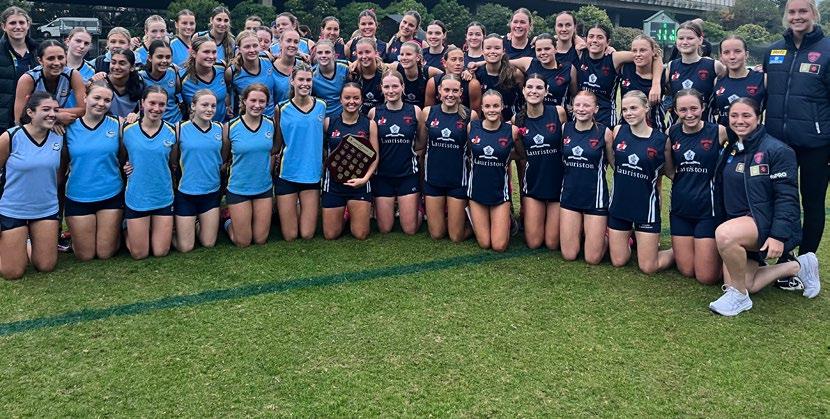
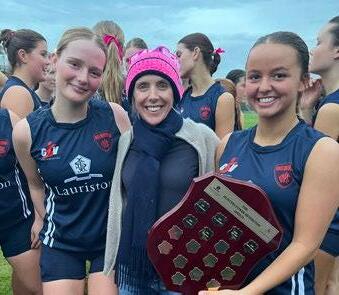
Dr Alison Manson, Vice Principal at Howqua, beautifully articulated the early experiences of the 2024 Howqua cohort:
“Any preconceived ideas or the expectations the girls had about their Howqua experience have slowly turned into authentic experiences that are uniquely theirs. While the program is built on a strong foundation and many aspects are similar year after year, the day-to-day experiences belong only to the students of 2024.”
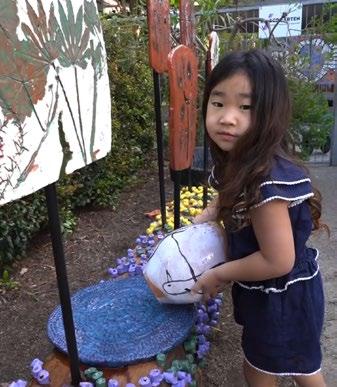
Congratulations to both St Catherine’s and Lauriston Senior AFL teams for their performance at the annual Huntingtower Heyington Shield.
It was a memorable performance from the Lauriston team that resulted in Lauriston winning the Shield for the third year running.
The enthusiastic supporters off-field – students, parents and staff – also played a key role in the team’s victory. Thank you also to Baker’s Delight for their support of the game, which raises valuable donations for Breast Cancer Network Australia.
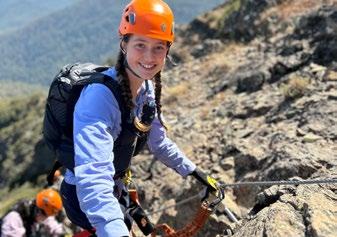
We have something very exciting for you to add to your Lauriston campus to-do list.
Go and visit the art installation just outside the Early Learning Centre gates.
The installation was created by the ELC students in collaboration with sculptor Deborah Edwards.
This is the second piece Deborah has created with the ELC students as part of the Artist-in-Residence program.
In addition to capturing the colours of the native flowers of our campus, it also provides a very important fixture for some other small residents at Lauriston – a bee bath!
Don’t miss it before it takes up more permanent residence in the new Blairholme Early Learning Centre later this year.
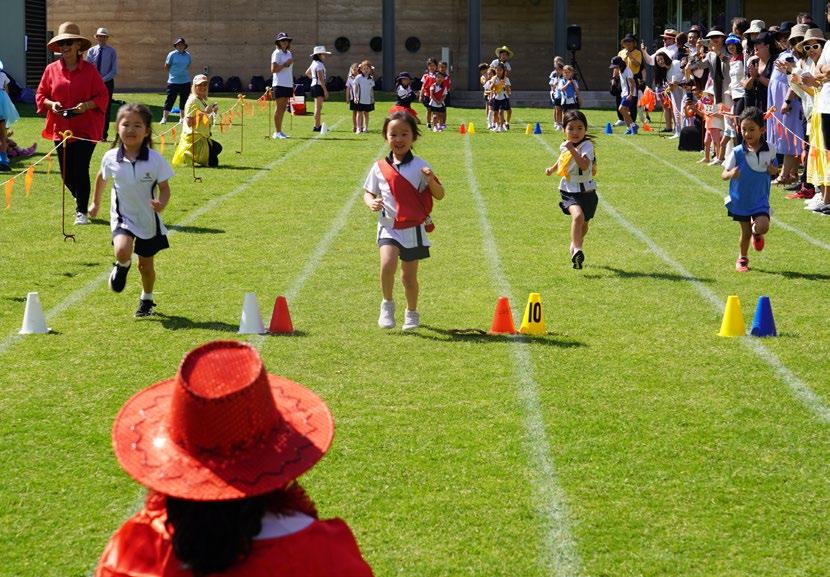
Irving Hall was transformed into a moody jazz club for the annual Jazz Cabaret Night.
The audience was mesmerised by a range of performances; from vocal soloists and instrumental combos to larger ensembles, including our Senior Jazz Band.
After many months of preparations, we congratulate our talented performers, ably supported by our dedicated Music staff.
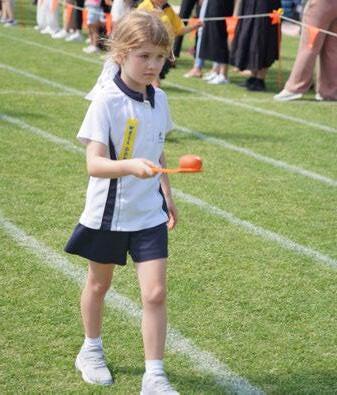
The Junior School Picnic Races are a highlight of the school calendar for students and their parents.
We encourage our Junior students to participate in friendly House sport events that build a strong spirit of camaraderie and provide invaluable opportunities to demonstrate leadership and courage.
For our Preps to Year 2s, the Picnic Races are an opportunity to not only experience the thrill of running in a relay team, but to chant with their House teammates. Events include sprints, relays, sack races and of course, the egg and spoon race.
A day of firsts, that will make them Lauristonians for life.
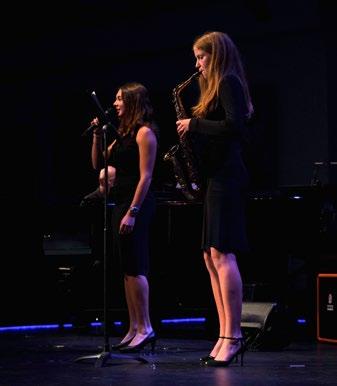
Thirty-one years ago, Senior Sergeant Proudluck from Malvern Police Station started the Malvern Emergency Food Program after he noticed locals shoplifting food from the supermarket.
Ten schools in Stonnington now take part every year in a competition collecting non-perishable food items. The items are made into food packages that can be picked up from Malvern Police Station by those in need or handed out by police when on patrol.
This year Lauriston had the greatest number of donated items and student participants. School Captains, Lotus and Alison, proudly collected the award on behalf of the School.
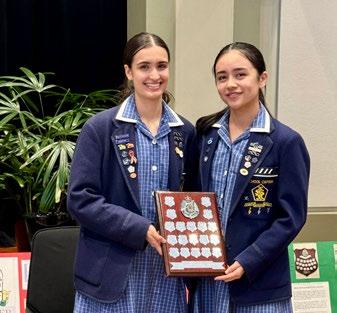
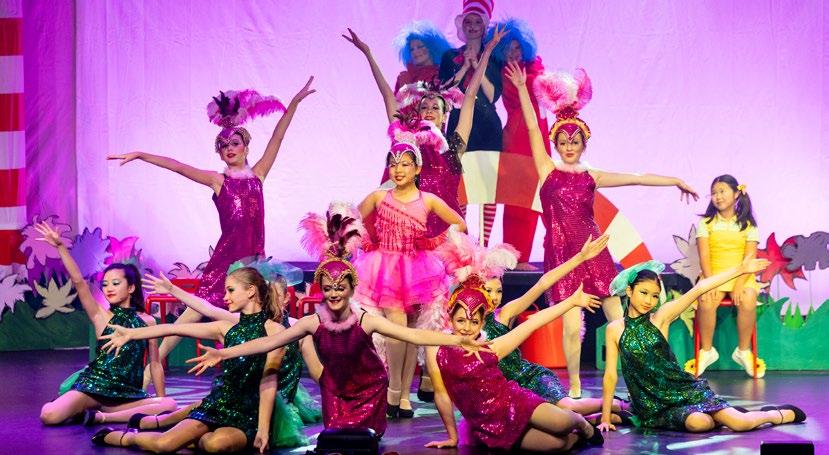
In the last week of Term 1, 60 excited, talented and committed students from Years 5–8 shared with the Lauriston community the heartwarming story of Seussical JR. The production was full of singing, dancing, acting, colour, energy and joy. For these students, as well as more than 50 behind the scenes crew, this provided them the opportunity for personal growth as they faced new challenges while developing unimagined and lasting friendships with students across the School.
Planning for Seussical JR. began in Term 3, 2023 with auditions happening across the last few weeks of Term 4. The auditions themselves are an opportunity for students to challenge themselves by stepping out of their comfort zones: 170 students across Years 4 to 7 took the brave leap of singing and acting in front of their peers. Students rehearsed three times a week for all of Term 1, requiring an extraordinary commitment from both staff and students.
The outstanding talent of each of the students was obvious as they beamed with newfound self-confidence and a sense of pride in their hard work and persistence.
Seussical JR. is a story of a person who is kind and loyal, a person who believes in equality for all, no matter their size, race or gender. It is the story that reminds us that being true to ourselves and recognising our own strengths is more important than what other people say or think about us. At Lauriston we value each student’s individuality, and this is something we felt was celebrated in this production.
Jannah Davies - Head of Drama
Kate Kennedy - Assistant Head of Music Curriculum & Head of Voice
“I loved Seussical because it improved my singing, dancing and acting. I loved getting to know all the others in the cast and making new friends. I can’t wait for next year’s musical, and I am definitely going to try again next year.”
Claire, Year 7
“Our Seussical performances were something I will remember forever. The relationships with friends, classmates and older girls were truly special. I found a new confidence in myself and the costumes, makeup, lights and sets were incredible; it really added so much more to the show. This experience got me involved in a completely new aspect of School life and I will cherish all our Seussical moments forever.”
Mia, Year 6
“Being backstage was really fun too, getting ready, getting the makeup done, and putting the costume on was definitely a big highlight!”
Charlotte, Year 5
“Being a part of Seussical was so special to me because it allowed me to connect with people I might not have realised would be such amazing friends. Performing on stage for such an engaging audience filled me with joy. I loved that I was able to make people happy and deepen my passion for theatre and performance.”
Eve, Year 8
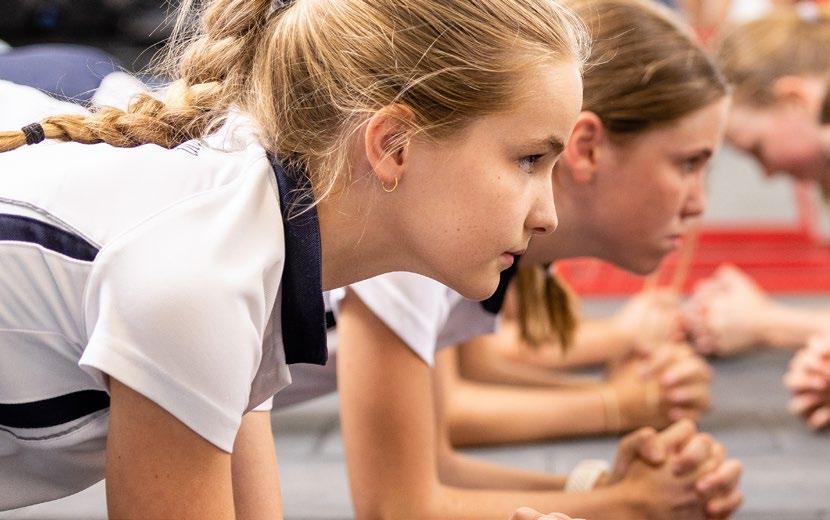
The Aspen Institute (2015) defines physical literacy as “the ability, confidence and desire to be physically active for life”. This suggests that as well as the physical element, social and psychological factors also play an important part in building physical literacy.
The initial reasons for children engaging in exercise revolve around fun, enjoyment and experiencing different activities (Allender, Cowburn & Foster, 2006) and the main causes for dropping out of sport are a lack of enjoyment and fun (Crane & Temple, 2015). This suggests that if we want to produce physically literate young people we need to foster an environment and approach based around enjoyment.
There are also strong links between wellbeing and physical literacy, with ACHPER Victoria and Victoria University’s research revealing that “there is much evidence to support that physically literate girls do twice as much activity than those who are not. They are happier and more trusting of other children, and higher levels of resilience are evident in children who demonstrate competency in these aspects of physical literacy.”
Key for long term engagement with physical activity is the early mastering of a foundational set of movement skills (International Olympic Committee Position Statement, 2015).
The Strength & Conditioning (S&C) Foundation Program at Lauriston aims to do exactly that. Our framework takes the athlete through the process of learning 14 key movements (see diagram) by working through 12 progressions, each increasing in complexity rather than adding more load.
This allows for a variety of starting points meaning those who are novices in a gym environment can build confidence and competence, while those more experienced can hone and perfect their technique.
The process of working through a structured framework helps to build a feeling of self-confidence and sense of achievement for the individual which can be extremely beneficial with regard to adherence and enjoyment.
The mastery of these fundamental movements alongside the soon-to-be launched speed program will help to enhance sports performance and make our young athletes more robust, regardless of what sport they participate in at Lauriston.
The PE, Sport and Strength & Conditioning departments at Lauriston aim to maximise the physical literacy of our students by providing an environment which prioritises:
• Enjoyment of physical activity
• Physical activity participation opportunities across a variety of sports & activities
• Motor skill development of fundamental movements
• Learning & increased knowledge of the hows & whys of physical activity
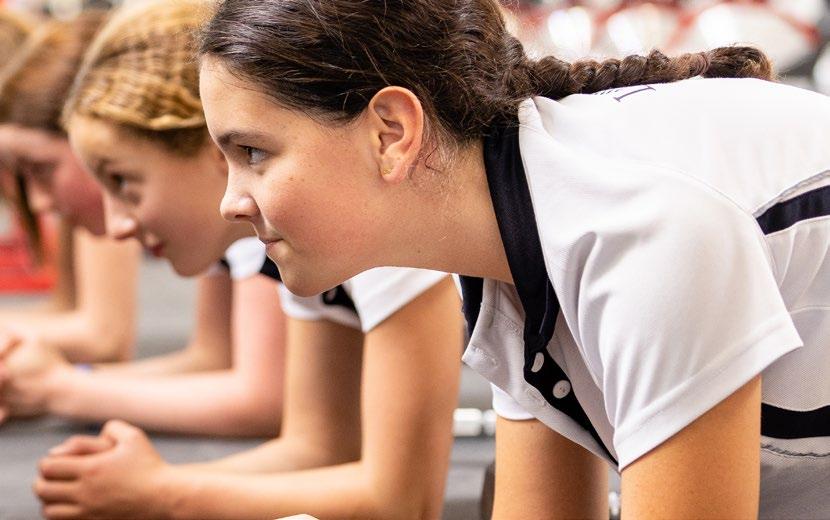
We are already seeing the impact of the program, as we record one piece of data per week from each athlete on a four week rotation. Those who have been consistently attending sessions regularly are beginning to reap the rewards:
Mean % Increase Over Term 1
Isometric Mid-Thigh Pull + 6.33% Vertical Jump + 3.45%
Reactive Strength Index + 7.81 %
With daily S&C sessions available before school and at lunchtimes, the Lauriston S&C program is steadily going from ‘strength to strength’, regularly welcoming new members with every level of ability.
At the beginning, I was really scared of doing something wrong or having the wrong technique, but then I learnt from others that mistakes and wrong techniques are really common and really normal, and they’re also easy to address. At the Lauriston gym, we’re working together towards the same goal.
Jade, Year 8
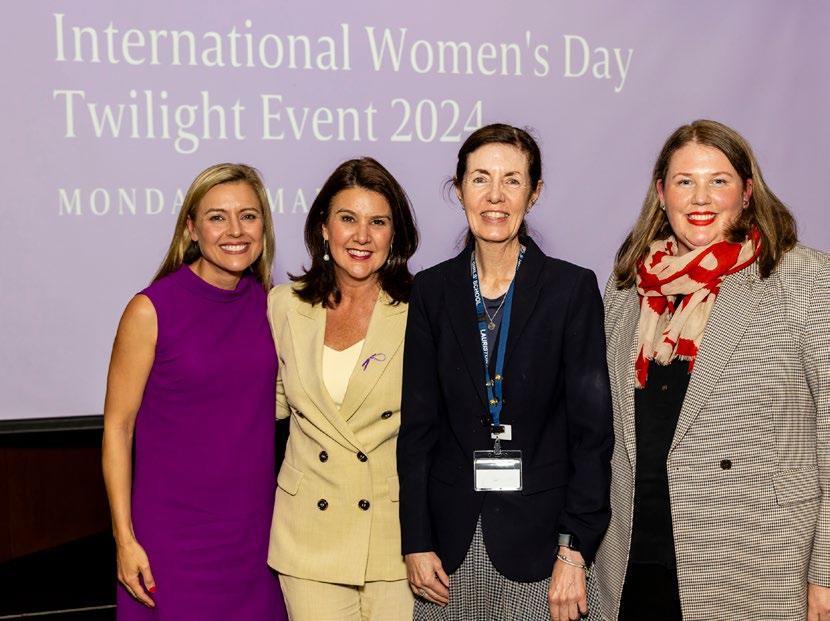
Lauriston Girls’ School hosted a thoughtprovoking International Women’s Day Twilight Event centred around this year’s International Women’s Day UN theme of accelerating gender equality through economic empowerment. As a girls’ school, we sought to engage all ages in our community to have conversations about financial education and independence for women and girls.
The event featured three distinguished Old Lauristonians who shared their insights and experiences across the fields of family law, government, and finance:
• Gemma Acton, CFA (OL 1998), 7 News Network Finance Editor
• Senator the Hon. Jane Hume (OL 1988), Chair of the Select Committee on the Cost of Living
• Caroline Paterson (OL 1993), Deputy Chair of the Family Law Bar Association.
The panel, chaired by Susan Just, offered invaluable perspectives on the importance of financial literacy and economic empowerment for women.
The discussion delved into the complexities of financial independence and highlighted the significance of early engagement in financial conversations. One attendee aptly noted: “Entering the conversation about financial literacy late is not just awkward... it’s dangerous.” This sentiment underscores the critical need to start discussing money matters early on, including how to earn, spend, invest and support others.
The insights shared by our esteemed panellists left a lasting impact on all who attended, inspiring our community to take charge of their financial futures. As a school, we are committed to fostering a culture of empowerment and equality, and events like these play a crucial role in advancing this mission.
For more information on Lauriston’s 2024 International Women’s Day please visit: lauriston.vic.edu.au/iwd
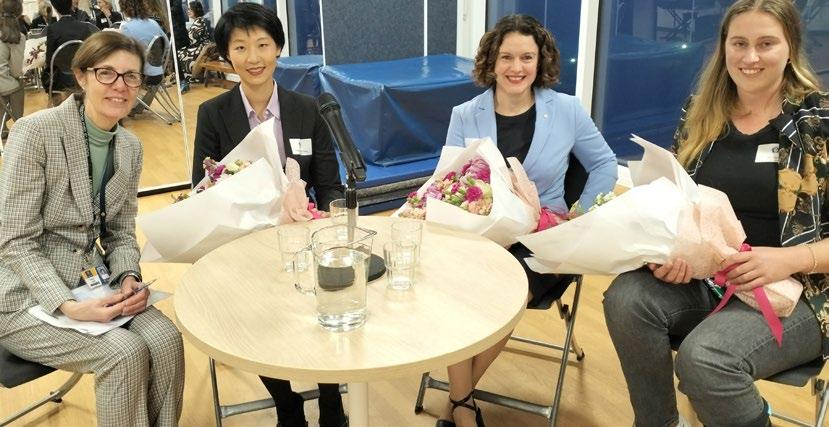
The Lauriston Foundation Annual General Meeting (AGM), held Wednesday 1 May, offers a unique opportunity for supporters of Lauriston Girls’ School to come together in celebration of our shared vision and the significant advancements made in 2023. This year’s AGM was particularly special as it not only highlighted our achievements, but also set the stage for the exciting developments on the horizon.
We had the privilege of welcoming three remarkable Old Lauristonians to our panel discussion:
• Yutian Fang (OL 2006) – Senior Software Engineer, Vivi
• Izzi Harris (OL 2016) – Film Director and Writer
• Adele Schonhardt OAM (OL 1996) – Co-Founder and Executive Director, Australian Digital Concert Hall and Executive Director, Melbourne Chamber Orchestra
These alumnae have made significant strides in the fields of expressive arts and innovation, and their insights and experiences provided a glimpse into the limitless possibilities our students can aspire to. Each of these alumnae shared their journey, inspiring the audience with their dedication and creativity. It was a powerful reminder of the potential nurtured within Lauriston’s walls and the impact of a Lauriston education on the broader world.
Adding to the evening’s inspiration was a captivating musical performance by Lauriston’s Senior Woodwind Ensemble. Their performance was not only a testament to the School’s commitment to fostering artistic talent, but also a reflection of the vibrant community that thrives at Lauriston.
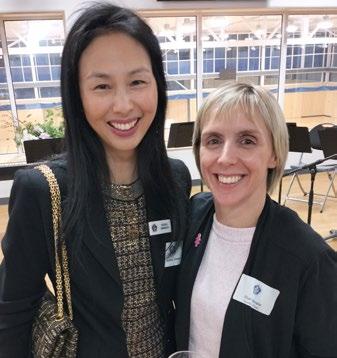
As we reflected on the past year’s accomplishments, including our successful fundraising initiatives and the implementation of key elements of our masterplan, we also looked ahead with excitement. The AGM reinforced our collective commitment to providing outstanding educational opportunities and ensuring the continued growth and success of our school community.
The Lauriston Foundation AGM was more than just a meeting; it was a celebration of our community’s achievements and an encouraging look forward to the future.
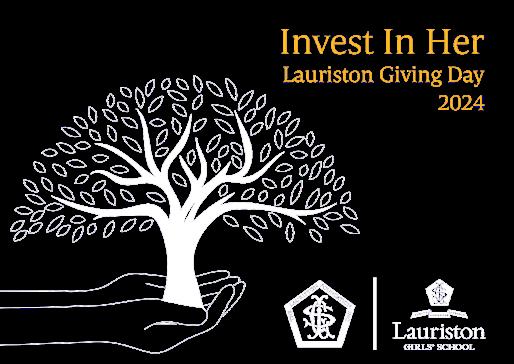
We are delighted to share the incredible news that, thanks to your unwavering support on Lauriston Giving Day, we have reached our goal! We are thrilled to announce that two needs-based scholarship students will begin their journey at Lauriston in 2025. This achievement is a testament to the philanthropic spirit of our community, and we extend our heartfelt gratitude to everyone who contributed.
On Thursday 30 May, the Lauriston Giving Day focused on supporting two needs-based Lauriston Foundation Scholarships. These scholarships offer financial assistance to students entering Year 7 and support them through to their graduation in Year 12, including their year at Howqua. We take great pride in offering these scholarships to girls who demonstrate intellectual ability, community-mindedness, and good character—students who, without this support, might not have the chance to benefit from the outstanding education and opportunities available at Lauriston.
Scholarships are transformative, not just for the recipients but also for their families and communities. The ripple effect of a scholarship changes lives, opening doors to a brighter future. In 2023, our inaugural Lauriston Foundation Scholarship recipient shared her heartfelt gratitude, saying, “The experiences at Lauriston have not only enriched my school life but have also instilled in me a sense of belonging. I cannot express enough how your support has made all this possible for me. Without you, attending Lauriston would have been an impossible dream.”
We look forward to welcoming our new Foundation Scholarship students in 2025, and we sincerely thank you for making this possible. Yet, our journey isn’t over. You still have the chance to support the Foundation Scholarship through the Huntingtower Lunch on Friday 13 September, 2024. Your continued generosity will help us provide a Lauriston education to even more students, transforming their lives and enriching our community.
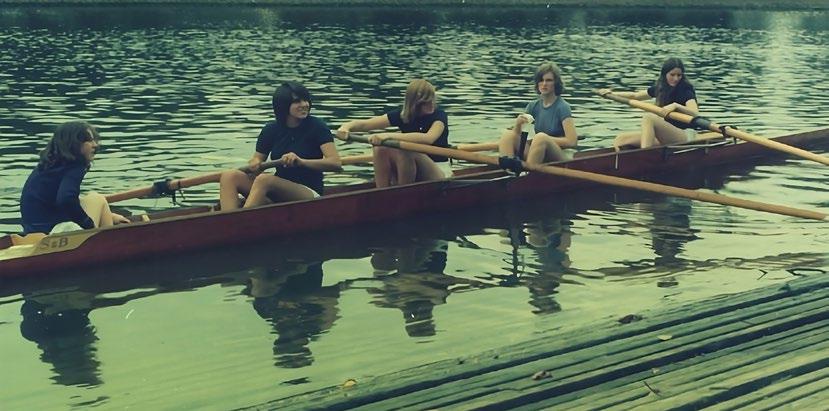
“On Sunday 7th September 1975, five Lauriston students sat in a boat and made it move… slowly.”
– The Lauristonian, 1976 edition
In 1975 Susan Fone (OL 1976), Jennifer Howe (OL 1976), Jill Olney (OL 1976), Peta Rigg (OL 1976) and coxswain Claire Warburton (OL 1976) together with their coach Michael Nicholson began rowing at Lauriston Girls’ School.
In a wide, wooden, easy to balance boat generously lent to us by Head Coach of Scotch College Rowing David Boykett, this pioneering group took their first strokes on the Yarra River and rowing at Lauriston was born.
Despite challenges faced by coaches and crew, in 1975 Lauriston became the first private girls’ school to affiliate with the Ladies’ Rowing Association. The Association began the ultimately successful campaign for a Head of the River competition for girls, first held in 1976. By 1982, Lauriston had six crews in training. In 1984, the school purchased two oars (in previous years boats had been borrowed from independent boys’ schools and the university) as well as receiving generous support, from several other organisations including Scotch College, Melbourne University, YWCA at Albert Park, and later Caulfield Grammar, Geelong College, Ballarat and Clarendon College, and, Wesley College for various regattas at their locations.
As our Rowing community prepare to celebrate the 50th anniversary of our proud Rowing club, we naturally reflect on our humble beginnings and pay tribute to those who paved the way then to ensure our current rowers have every opportunity available to them.
This season the Lauriston Rowing Club has 65 girls rowing from Years 10, 11 and 12 rowing in quads and eights. We have 11 coaches and our results are improving each season, but most importantly our community is stronger than ever. This was never more evident than at the recent Head of the Schoolgirls parents dinner when we launched fundraising for a new eight donated by the entire community to mark the 50th year of Rowing at Lauriston. Incredibly generous donations have flowed in, including from our youngest OLs.
Since those early days of borrowed sheds and boats, Lauriston Rowing has produced lifelong friendships as well as a pool of talented Olympians and outstanding coaches such as Sue Chapman-Popa (OL 1980), Jessica Morrison OAM (OL 2010) and coach Nick Green, not to mention Victorian and Australian Champions Sarah Paterson (OL 1993), Samantha Tilbrook (OL 1994 and current parent), Sophie Loras (OL 1994) and Catherine Knight (OL 1994). These women and men are to be celebrated in our 50th year of Rowing and we look forward to showcasing everyone in our Rowing community at an event on Sunday 1 December at the Ullmer Sports & Wellbeing Centre.
With our outstanding Head Coach Mr Jack Steel leading our community with values, direction and coaching excellence, Lauriston Rowing is strong, dedicated, and ready for the next 50 years of rowing.
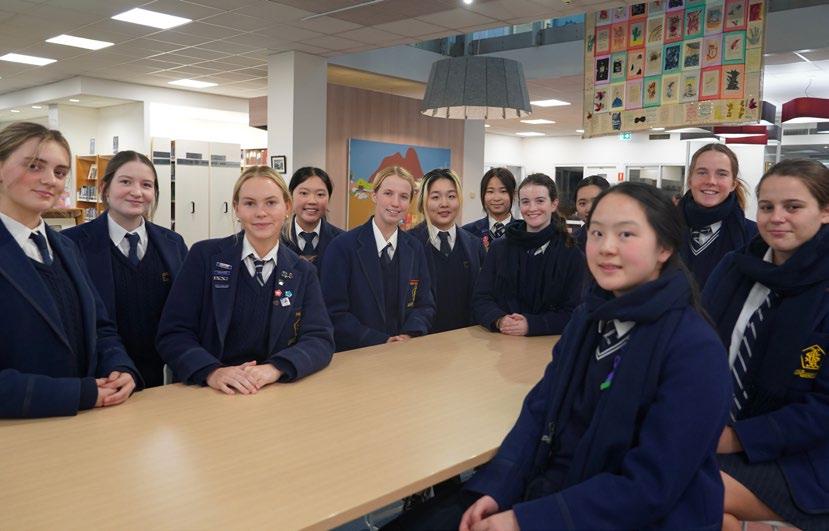
Founded by Margaret Gurry, Friday Night School has supported primary and secondary students and their families for the past 26 years.
Friday Night School started with five children and five adult volunteers and quickly burst into life as the word spread.
Since its inception, Friday Night School has evolved to include a Scholarship and Bursary program, Wednesday Night Tutoring, Tuesday Night Reading program, an adult literacy group, an annual camp and an end of year party.
Lauriston has offered peer-to-peer learning with Friday Night School for over 15 years, helping to break down cultural boundaries and learning in an informal environment.
Each Friday over term time, more than 300 students meet at St Ignatius Parish Hall in Richmond. Tutors come from various Melbourne schools including Xavier, Loreto, Star of the Sea, Sacre Coeur, Sienna and Genazzano.
Students come from many different countries including Vietnam, Ukraine, Timor Leste, Sudan and Ethiopia and range in age from five to 18 years of age.
Lauriston provides 15 tutors and one supervising teacher each week. All our students look forward to Friday Night School, finding it both incredibly rewarding and
enjoyable. Tutoring the same student each week enables our girls the chance to bond and watch them achieve something they previously found difficult.
Friday Night School creates positive relationships that are rewarding to both tutees and tutors, has a positive, contagious vibrant energy, and is full of laughter and connection – you walk away feeling like you have been a part of something very special.
We both started Friday Night School because we wanted to make a positive impact and had hear lots of great things about the program and its relationship with Lauriston. Each week, we take part in tutoring kids who are disadvantaged, and it brings us both so much joy, since this has enabled us to pass on the knowledge that we have gained from our schooling at Lauriston onto others. It is so fulfilling to be able to help others in need and to not only share knowledge but gain from younger and different minds. The best part is that you get to tutor someone new every single week while maintaining relationships with the past students you have tutored!”
Lucie and Harriet – Lauriston Community Service Captains
Sarah Jessup Community Service Coordinator
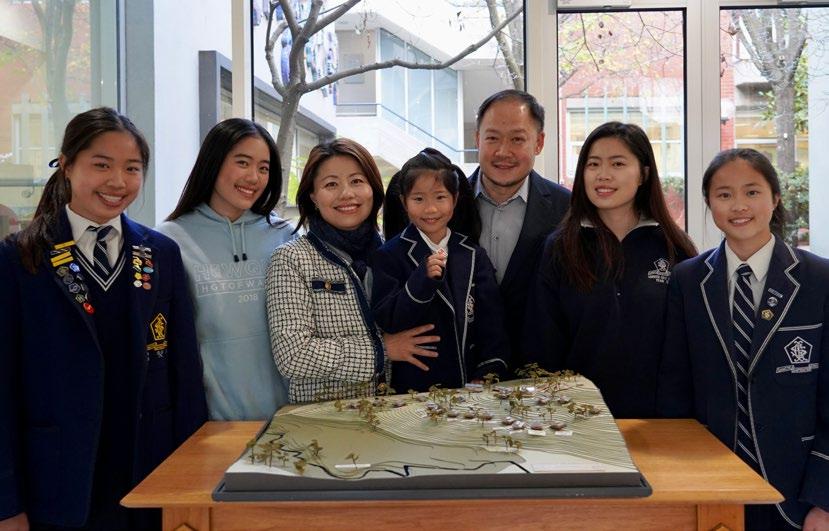
We are thrilled to announce the exciting developments at Lauriston Girls’ School’s Howqua campus, made possible by the generous support of our community through the 2023 Howqua House Appeal.
The architects have crafted a design for the 11th Howqua House that harmonises with the existing residences, while incorporating several thoughtful enhancements to improve the experience for our students. These updates include:
• Enhanced Privacy: Exploring opportunities to create more private spaces in bunk areas.
• Increased Communal Storage: Adding more communal storage space for students’ convenience.
• Natural Light: Introducing natural light in wet areas to create a brighter and more welcoming environment.
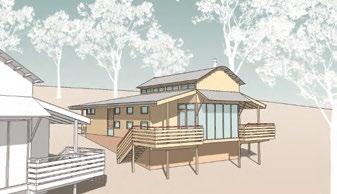
Construction is set to begin in late 2024, with completion expected in the first half of 2025. We eagerly anticipate welcoming the first residents in 2026.
A special acknowledgment goes to the Wu Family, whose extraordinary generosity has made a significant impact on this project. In recognition of their commitment, the School Council is working collaboratively with the family to determine a House name that honours their support. We are excited to share more information with our community in the near future.
Thank you once again to all who have supported the development of the new Howqua House. Your contributions are not only helping to build a house, but also creating a home away from home where future generations of Lauriston students will grow, learn, and thrive.
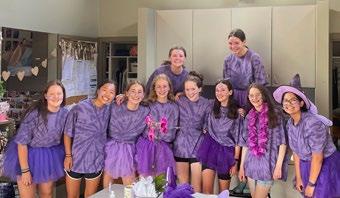
Teacher and students at Little Lauriston, 1952.
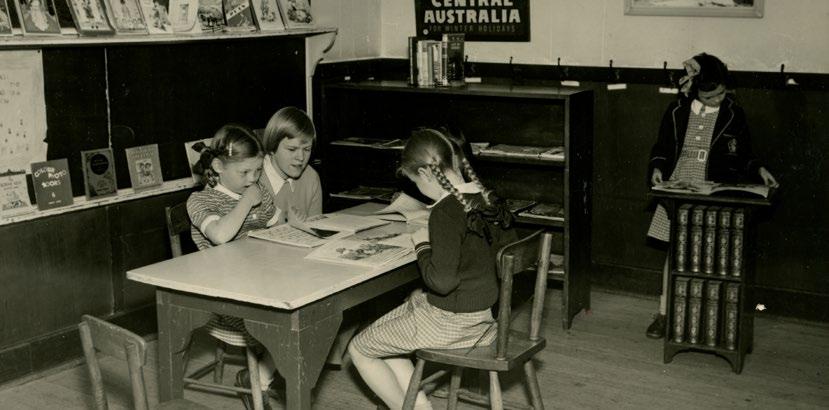
To celebrate the impending opening of Blairholme, an exhibition is being put together that documents Lauriston’s history of educating both preschool and primary age children from 1901. This will include a linear timeline of events and building changes, written memories of our alumnae, teaching staff and extended community.
Over the next year, we invite members of the Lauriston community for more offers of both written memories and tangible items to display within the exhibition. The intention is to change the display cases every couple of months to showcase as many Lauriston memories as possible and to engage with our wonderful community.
The hope is to collect our alumnae’s memories from the mid twentieth century onwards from both the women and men who went to kindergarten and primary school at Lauriston’s facilities, including:
• Little Lauriston (1944 to 1953)
• Niall House (1974 to 1997)
• Niall House (formerly Howie House, opened 1997)
• Sutherland House (2004 to 2017)
• Michael House (1964 to 2021)
• Blairholme (opened 1976)
• Kindergarten, Pre-Prep and Junior School at Armadale campus
The exhibition will begin late in Term 3. To let our alumnae speak for themselves, here are examples of the memories that have already been received.
“I do remember part of my first day at Little Lauriston which I believe was in 1951. I remember getting dressed in my new school uniform and having my photo taken before I left home.
On arriving at school, I believe my teacher was Miss Strike and I wondered if she did? I remember my Mum showing me to a spare chair which was next to an oblong low table. Other children were also sitting around the table. In the middle of the table were a number of lovely wooden jigsaws. I remember choosing one which I think was of a train and set about putting the puzzle together.
When I had finished it, I turned around to show my Mum, but she was nowhere to be seen! I don’t remember being upset just surprised and I think I consoled myself that I was a big girl now and at School.”
Christine Parks (nèe Harvey, 1963) Chris Parks
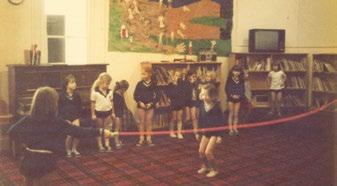
“I had fun at Niall House.
The oak tree on the inside of the side gates was a cool shady spot. We liked to throw a ball against the targets painted on the side wall of the house. The acorns and leaves were used for activities in our classroom.
In the “big room” there was a large bucket of Mobilo and a piano. After lunch we had to lie down in the “big room” on our mattresses for a sleep and the back room was where Mrs Pettigrew mixed the paint.
There was a huge, in-ground trampoline next to the cherry tree in the front garden.
At 2.30 each afternoon I went to the staff room with Mrs Pettigrew where she gave me afternoon tea of family assorted biscuits until mum finished teaching.”
Ben Holko, kinder student 1980 to 1981 and son of Pam Holko teacher at Lauriston.
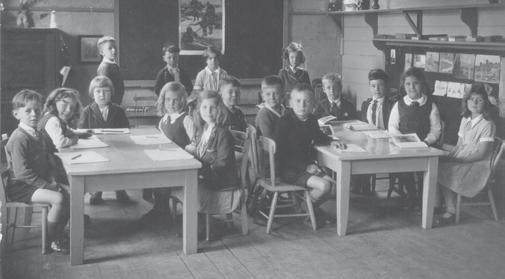
“The playground at Blairholme is what I remember most from my two years there in 1984 and 1985. The large camphor laurel tree at the front of the house was very big back, even back in the 1980s. It was surrounded by a round sandpit and between the sandpit and front steps was a semi-circular gravel driveway, which curved past the front door.
In the morning the mothers – it was mostly mothers back then – drove around the driveway to drop their little daughters at the front steps and kiss them goodbye, leaving lipstick imprints on their little faces.
Next to the camphor laurel was a lovely mature crepe myrtle, which was good for climbing and along Murray Street was a big old hedge. You could crawl right underneath the hedge and scramble along the picket fence line – an excellent secret hideaway. There was also a large tennis-court-shaped lawn area in the south-west corner, which was the place for ‘sport’.
There was also a paved brick area out the back where we ate our lunches and a large fig tree, I think. Was there some sort of pergola with a creeper to provide shade? I feel as if there was. There must have been some play equipment too. A timber A-frame with swings comes to mind, but only vaguely.”
Kate Wilson (nèe Jackson, 1995)
Lisl Bladin Archivist
We wish to acknowledge recent donations to our archives collection.
Photographs, DVD and volume entitled Living the Values of
The Lauristonian 1975 (original printed edition later redeveloped), Valedictory programs 1976 to 1978, Libretto student magazine, and “The Admirable Crichton” JM Barrie, program 1978.
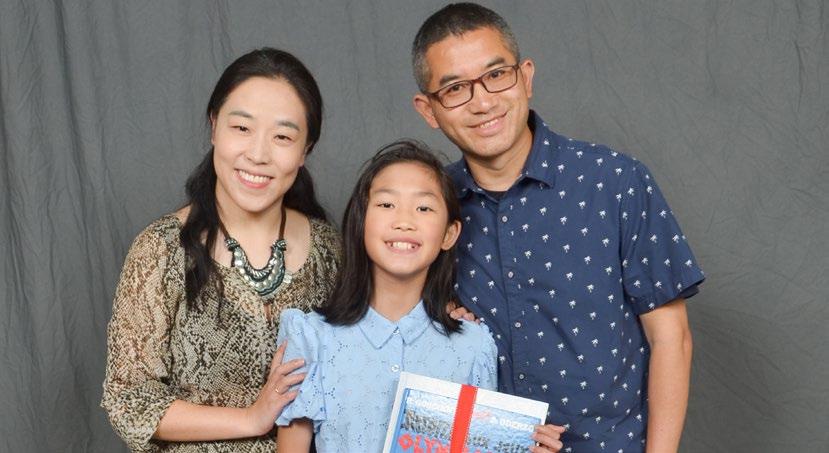
A letter from a testator
Bequest, a word we usually hear in movies or on TV, has now become a symbol of love within our Lauriston family.
As individuals of Chinese heritage, our culture instils in us the values of positivity and harmony. During Lunar New Year, we wish for good health and longevity. We strive to navigate life with hard work, kindness and a conscious avoidance of negative and sad topics such as death. Yet, despite our hesitance, the ideas of ‘will’ and ‘bequest’ persist as silent reminders.
Upon observing the act of bequeathing, we come to realise that death isn’t just about bidding farewell; it’s about leaving behind something invaluable to those we love. It’s like planting a tree whose fruits will nourish generations to come – an act of passing on a part of ourselves, our beliefs and our hopes to generations ahead.
I feel incredibly lucky to be my daughter’s mother. She’s not just a loving, positive kid, but also an amazing young woman who inspires me every day. It wasn’t her that made us make the bequest to Lauriston, but something else.
The moment we decided to make a bequest happened at a Lauriston concert. Seeing Lauriston girls perform on stage was truly special. It made me reflect on my own life and journey as an immigrant, how challenging yet rewarding it has been.
Even today, women, especially those with Asian backgrounds, often play quieter roles in society and at home. But it is changing in front of us. These girls are about to start their own stories, armed with courage, wisdom, and love – Lauriston is where their journeys begin.
So, we decided then and there to make the bequest. It’s not solely for my girl, but for all the girls whose paths we may never cross. It stands as a testament to the deep-seated pride we hold for Lauriston and its community, a humble contribution towards a shared destiny.
Though the future remains uncertain, our faith in these young women remains firm. Our deepest wish is for their continued growth and empowerment – for within each girl lies the potential to shape a brighter tomorrow.
Thank you for stepping up and leading the way as the thinkers, doers and leaders of tomorrow.
Joy Yin Current Parent
Explore your options via the QR code to access our complimentary Online Wills platform, provided through Lauriston’s partnership with Gathered Here. By taking advantage of this service, you may consider leaving a Gift in your Will, ensuring your Bequest supports our future generations of Lauriston students.

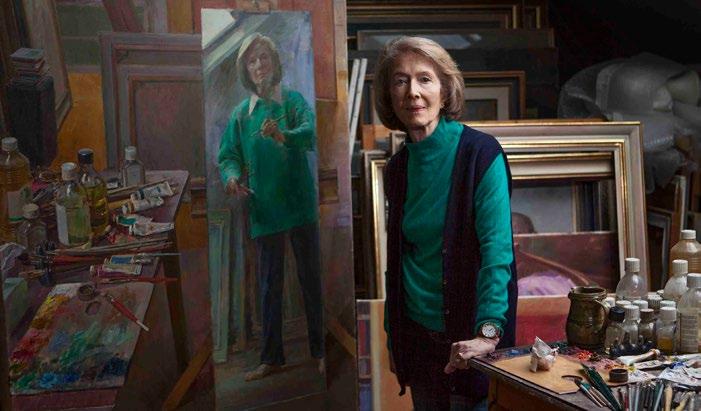
It is with profound sadness that we announce the passing of June Mendoza, a distinguished portrait painter whose remarkable career spanned decades and continents. June, who held numerous prestigious titles including Officer of Australia (AO), Officer of the Order of the British Empire (OBE), and memberships in the Royal Society of Portrait Painters (RP) and the Royal Institute of Oil Painters (ROI). June passed away peacefully on 16 May 2024, just shy of her 100th birthday.
June’s career as an artist began in her teenage years while at Lauriston, with her work ranging from book jackets and magazine illustrations to record sleeves and townplanning exhibition artwork. Hanging proudly in Irving Hall at Lauriston is a portrait of former Head Mistress Gladys Davies, painted by June and gifted to the School in 1973.
Her life and career took her around the globe, including significant periods in the Philippines (1960–1965) and Australia (1969–1973) due to her husband’s overseas postings. Married to Keith Mackrell, they raised four children: daughters, Elliet Mackrell (OL 1972), Kim Mackrell (OL 1974), and Lee Mackrell (OL 1977) and son, Ashley.
June’s illustrious career is best reflected in the impressive roster of subjects she painted. Her portraits include members of royalty such as Her Majesty Queen Elizabeth II, HRH Diana Princess of Wales, and HRH The Duke of Edinburgh. Other notable sitters included Baroness Margaret Thatcher, Sir John Major, Dame Joan Sutherland, Yehudi Menuhin, Sir Thomas Allen and Lord Geoffrey Howe, among many others.
June was presented with honorary doctorates from the University of Bath and Loughborough University, and she was a Freeman of the City of London. Her contributions to the arts and her exceptional talent have left an indelible mark on the world of portraiture.
June Mendoza’s legacy lives on through her vast body of work, which continues to inspire and captivate. She will be remembered not only for her extraordinary artistic achievements but also for her dedication to her craft and her ability to bring the essence of her subjects to life on canvas.
Lauriston Girls’ School together with the Old Lauristonians’ Association extends condolences to the family of Alice Charles (Andrew, OL 1937), who passed away peacefully on 23 November 2020 at the age of 100. Alice was born in February of 1920 and was a valued member of the Class of 1937.
Lauriston Girls’ School together with the Old Lauristonians’ Association wishes to advise our community that Susan Lowther passed away on 5 August 2022, after suffering from Alzheimer’s.
In 2019, Susan’s daughter Jane Tassigiannakis (Lowther, OL 1979) wrote to the School and said, “Can I take this opportunity to thank the School on behalf of mum, who as an old Lauristonian, has kept in touch with her school friends for over 75 years, and it is these core friends that still regularly visit mum and keep her happy. These friendships have endured all those years, and she still recognises them all.”
We hope Susan’s family take comfort in the wonderful memories of their dear mum.
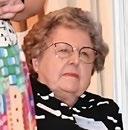
The Old Lauristonians’ Association together with Lauriston Girls’ School acknowledges the passing of Heather Wilson, who passed away on 22 January 2024.
At School, Heather was a Probationer, and her leadership skills served her well, right up until last year when she helped organise the OLA Sydney Chapter Reunion at The Queen’s Club. Even though she felt unwell during the evening, her strength shone through, and she flourished in the company of Old Lauristonians who attended the evening.
From 1957 The Lauristonian: Heather Barlow, 1945–56. Probationer 1956, Member of Tuck Shop Committee 1956, Leader of Grounds Committee 1956, Member of Senior Choir 1956. Gained leaving certificate 1955 in five subjects and one matriculation subject 1956.
We extend our heartfelt condolences to Heather’s husband Bryan and to her extended family and friends.
AUSTIN (HARRIS, OL 1963)
It is with much sadness that we advise our community of the passing of Rosemary Austin, who passed away on 15 December 2023. She will be missed by her husband Gary and her family. Rosemary has lived in Queensland for many years, but as a girl was known at School as a wonderful seamstress, being joint Captain of the Craft Club in 1963.
RUTH MARKS
(MICHAELIS, OL 1949)
Ruth Marks (Michaelis, OL 1949), beloved mother, sister, aunt, grandmother, and great-grandmother, passed away on August 11, 2023. She leaves behind a legacy of love, kindness and cherished memories that will forever be treasured by her family and friends.
We extend our heartfelt condolences to her daughter Sonja Keith (Marks, OL 1981), her sister Sally Cohen (Michaelis, OL 1955), nieces Susan Michaelis (OL 1979), Merran Morwood (Michaelis, OL 1980), Kate Ramos (Cohen, OL 1981), Sophie Cohen (OL 1986), Vanessa Cohen (OL 1988) and other family members including grandchildren and great-grandchildren. Her presence touched the lives of many, leaving an indelible mark on those fortunate enough to have known her.
JUDITH LEVY (SOUTHWICK, OL 1966)
It is with sorrow that we advise our community on the passing of Judith Levy, who passed away on 2 October 2023. Judith was a fond member of the Class of 1966 and was known at School for her prowess on the tennis court. We extend our condolences to Judith’s family.
SUSAN WATSON (MANNING, OL 1964)
Sue passed away in February 2024, after a courageous and prolonged battle with pancreatic and liver cancer, and will be sadly missed.
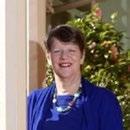
SUZANNE COLLISTER (JOHNS, OL 1978)
It is with much sorrow that we advise our community of the death of Sue Collister, who passed away on 4 February 2024, after a brave and fierce battle with breast cancer.
Sue dedicated her life to educating girls, which was evident by her rich career at St Catherine’s School where she held positions such as History and Geography teacher, Director of Student Services, English Exchange Coordinator, Senior School Coordinator, Year 12 Coordinator, and finally as Director of Boarding Services since 2007. She impacted the lives of hundreds of girls over the years, and she will be missed.
We extend our heartfelt condolences to Sue’s sisters Jenny Elliott (Johns, OL 1975) and Kath Johns (OL 1982), her husband Marc and their children.

ANNE BOYCE (DUMBRELL, OL 1976)
It is with profound sadness that the School mourns the loss of Anne Boyce (Dumbrell, OL 1976), who passed away on Tuesday, 7 May. Anne was not only a cherished alumna but also maintained a strong bond with the School as a parent. She contributed immensely to various aspects of School life, including Snowsports, the LPA, the OLA, Lauriston Rowing, and supporting fundraising endeavours.
Anne’s absence will be deeply felt, particularly by her husband Andrew and daughters Emily Boyce (OL 2017) and Sarah Boyce (OL 2013). Our thoughts are with them during this difficult time. Anne will be dearly missed by her many friends and family members, who will undoubtedly feel the void left by her absence.
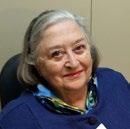
SUE INGHAM (HENRY, OL 1961)
Lauriston Girls’ School, together with the Old Lauristonians’ Association mourns the passing of Susan Ingham (Henry, OL 1961), a cherished wife, mother, writer, researcher, and environmental activist, who passed away on April 29, 2024.
After attending Lauriston and being involved in many sports and drama productions, Sue pursued a degree in Art History at Melbourne University, laying the foundation for a lifelong journey into the world of art. Driven by a fervent curiosity and a desire to experience art firsthand, she travelled overseas after her graduation. Her adventures led her to Italy, where she met and married an Englishman, marking the beginning of a beautiful partnership. Together, they returned to Australia and raised two sons, sharing over 50 years of adventures and creating a loving family.
Susan’s professional life was as vibrant and multifaceted as her personal one. She was deeply involved in the world of art and education, teaching art history to students and continually expanding her knowledge. Her academic journey culminated in a PhD in contemporary Indonesian art, a pursuit that took her to Indonesia multiple times over six years.
Her later years brought new challenges and directions. Susan became a passionate advocate for environmental preservation, focusing her efforts on protecting the precious green spaces of Sydney’s suburbs.
Susan’s life was a testament to the power of curiosity, passion, and commitment. She will be remembered for her intellect, her adventurous spirit, and her unwavering dedication to making the world a better place.

It is with immense pride that we advise that Penny Fowler (OL ’80) has been awarded Australia (AM) award. This honour was awarded for her significant service to the community through a range of organisations including the Good Friday Appeal.
Chairman of the Herald & Weekly Times, Penny is News Corp Australia’s Community Ambassador and is passionate about building News Corp Australia’s legacy of supporting communities. Penny is also Chairman of the Royal Children’s Hospital Good Friday Appeal, Deputy Chair of The Royal Botanic Gardens Victoria, and Chair of The National Portrait Gallery. In addition, she is a Board member of Tourism Australia, Tech Mahindra and sits on the Advisory Board of Visy/Pratt Industries and The Bank of Melbourne Foundation. She is also honoured to be an Ambassador for The Australian Indigenous Education Foundation (AIEF) and SecondBite.
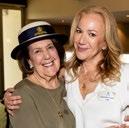
On Simchat Torah in 2023, Suzie Brown OAM, an Old Lauristonian from the class of 1958, achieved a historic milestone in the Jewish faith by being made Callah Torah, the first woman in Australia to receive this honour.
Suzie attends the St Kilda Shule, where her dedication to her community and faith has been long recognised. Known as the Bride of the Torah, this prestigious title reflects her lifelong commitment and will accompany her throughout the rest of her life.
Suzie’s achievement is not only a personal triumph but also a significant moment in Australian Jewish history, symbolising progress, and inclusivity within the faith. Her recognition as Callah Torah honours her personal achievements and sets a precedent for future generations of women in the Jewish community.

As a self-proclaimed “Laurichick”, Lisa Hasker OAM (1985) looks back on her education at Lauriston as the start of not only her passion for sport, but her introduction to her career path in the industry she relishes. After Lisa graduated from Lauriston, she ventured to the University of South Australia to undertake a Bachelor of Education (Physical Education and Science). Her educational pathway has also seen her complete postgraduate studies in a Graduate Diploma of Business (Sport Management) and Education (Sports Science), a Masters of Marketing, a Company Directors Course, MAICD, Governance and a Professional Certificate in Player Welfare and Development.
After starting her career in the early 1990s as a Physical Education and Science teacher at Wesley College, Lisa moved into Head of Sport roles before moving into the sports industry.
Lisa is a marketing, sponsorship and events specialist and has held roles as Sponsorship and Public Affairs Manager at the Victorian Institute of Sport, Manager of Sport Partnerships at La Trobe University and General Manager of Community and Stakeholders Relations at Basketball Australia where she oversaw the commercial, community, and media teams.
For the past 6 years, Lisa has led Vicsport as Chief Executive Officer.
Her contributions to the sport industry include her appointment as Chairperson - Athletes for Hope Australia, Deputy Chair - AFL Sports Ready Foundation, Advisory Council Member - Australian Sports Innovation Centre of Excellence, Coach - Hurdles and Sprints, Sandringham Athletics Club, Director - Shooting Australia, Vice President - Athletics Victoria, Volunteer CoalitionAustralian Sports Commission, and Volunteer Taskforce, Victorian Department of Families, Fairness and Housing.
In her spare time Lisa continues to coach athletics, specifically hurdles, and holds a Level 4 coaching qualification.

ADELE SCHONHARDT OAM (WORTH, OL 1996)
Photo credit: Albert Comper
From Year 7 at Lauriston, Adele flourished at all things “music” and in her final year was the Leader of Choirs, an active member of the Lauriston Senior Orchestra, Symphonic Wind Ensemble/Big Band, and Leader of the Anthem Choir. She also received the OLA Award for Music.
Since her Lauriston days, she has spent two decades connecting people through music, most recently as CoDirector of the Australian Digital Concert Hall (ADCH) in partnership with Chris Howlett.
ADCH was founded to support Melbourne musicians during lockdown but has since gone national, broadcasting over 1,000 live performances since March 2020, and generating more than $4 million for Australian artists and industry workers.
Formerly Media & Public Affairs Manager at Musica Viva Australia, Adele’s career has taken her from Germany’s largest opera house in Baden-Baden to the League of American Orchestras in New York.
A graduate of the Melbourne Conservatorium of Music, she later completed an Executive MBA at the Australian Graduate School of Management (UNSW), where she was honoured to receive the University’s Anita Prabhu Women Leaders in Business Award in 2021.
Together with Chris Howlett, Adele was named one of the country’s Top 100 Arts & Culture Leaders by The Australian in 2022. She also shares in a Sidney Myer Performing Arts Award (2021), the 2021 Arts Leadership Award from Creative Partnerships Australia, the 2021 Australian Artist of the Year Award (People’s Choice) from Limelight Magazine, the 2021 APRA AMCOS Art Music Award (Luminary Organisation), a Green Room Award (2021) and a National Live Music Award (2020).
She lives in Melbourne with her husband and two daughters.
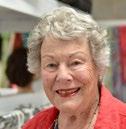
KATHRYN SMITH (OL 1960)
Congratulations to Kathryn Smith, who has been honoured as the Citizen of the Year 2024 by the South Gippsland Shire Council. Kathryn’s remarkable contributions to the community were celebrated at an awards ceremony held at the Meeniyan Mechanics Institute Hall on Wednesday 17 January.
Over the past two decades since relocating to Meeniyan with her late husband, Kathryn has actively participated in 36 different organisations and initiatives. Widely regarded as a dependable, industrious, and dedicated individual, Kathryn consistently volunteers her time and efforts to assist others. Whether she’s baking goods for a church fundraiser, lending a hand at Lacy’s Jewellery Studio and Gallery, hosting the Meeniyan Australia Day celebrations, or engaging in discussions about Meeniyan’s future, Kathryn approaches each task with enthusiasm and a warm smile.
As an Elder within the Meeniyan Christian Fellowship, Kathryn plays a pivotal role in guiding, managing, and supporting individuals spiritually, emotionally, and physically during times of need.
Congratulations once again to Kathryn, a wonderful and engaged Old Lauristonian for this well-deserved recognition!
On Thursday 23 May, nearly 100 Old Lauristonians attended a sensational evening of professional networking at The Lyceum Club in Melbourne. Thank you to Vice President Paula Giles (OL 1971) for graciously hosting us.
We were so thrilled to showcase three remarkable Old Lauristonians during the evening. We heard from renowned crime author Chloe Hooper (OL 1991) and Australian rock singer-songwriter and musician Deborah Conway AM (OL 1977). A panel conversation, spearheaded by resident 3AW psychologist and co-host of podcast Human Cogs Sabina Read (OL 1988), explored Chloe and Deborah’s creative insights.
Chloe spoke about her two novels and three works of nonfiction, focusing on her most recent novel Bedtime Story –a profound and moving exploration of the dark and light of storytelling.
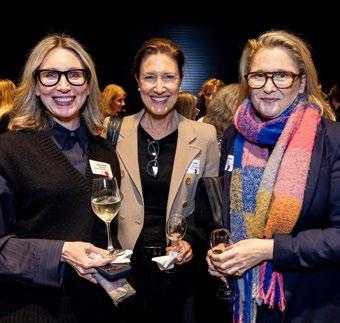
The Alumnae office is delighted to offer new graduates and young alumnae the opportunity to connect with families who are seeking tutoring or mentorship support for their children who are current students at Lauriston.
If you are a young, Old Lauristonian who tutors, please scan the QR code and register to the TutorConnect Directory.

Deborah spoke about her recently published memoir Book of Life – a no-holds-barred memoir that charts the rise and fall – and rise – of Deborah. We were also thrilled to welcome Deborah’s mum Elizabeth Conway (Mendes, OL 1951) who unlike Deborah, wasn’t a keen performer.
All three alumnae made mention of beloved former Performing Arts staff member Val Heath, who was at Lauriston for 30 years – 1974 through to 2004.
Following the panel discussion, guests were treated to a performance by Deborah and her husband, musician, producer, composer Willy Zygier.
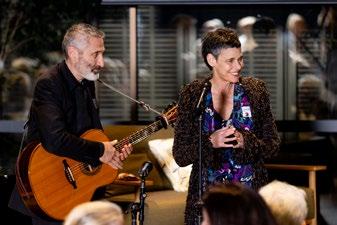
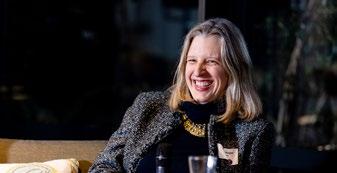
We understand that many current families at Lauriston wish to seek support for their child to assist with their academic development and to enhance their learning. If you would like to connect with an Old Lauristonian who tutors, please scan the QR code and complete the enquiry form.

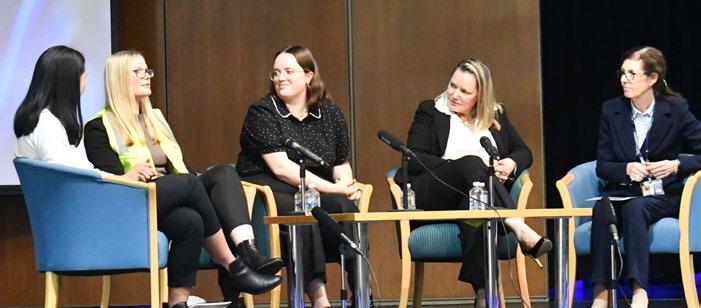
The Student Futures Week in May was a phenomenal series of events for our students and our Old Lauristonians. We welcomed back many Lauriston alumnae who contributed to three major events:
Senior School Assembly on Monday 13 May
Niti Nadarajah (OL 1996) and Sarah Gibbins (OL 2001) addressed senior students, sharing insights about their careers and the future of the workforce.
Women in the Workforce Panel on Wednesday 15 May
Mel Davey (Owen, OL 2004), Eleanor Morton (OL 2019), Tracey Chong (OL 2016), and Dianne Banks (Barkley, OL 1994) joined Principal Susan Just for a discussion about women in the workforce. The event, attended by senior students and parents, also featured a university fair with representatives from institutions across the country.
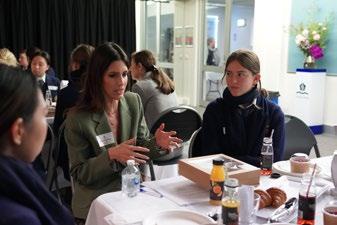
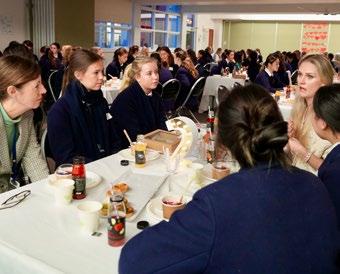
Year 12 Breakfast on Friday 17 May
Our Year 12 students enjoyed a beautiful breakfast where each table was hosted by an Old Lauristonian who offered career advice to students. Sarah Grynberg (OL 1998) was the phenomenal guest speaker at the breakfast, inspiring students with her presentation about ‘Living a Life of Greatness’. She emphasised the fulfillment that comes from helping others and pursuing a purpose-driven career. Thank you to Alex Harvey (OL 2002) who was MC at the breakfast, recounting memories of when she was at School, with a career pathway ahead.
Early in February, Georgie Burgess (OL 2021) returned to School to speak to students as part of the Year 6 Leadership Conference.
Georgie started at Lauriston Girls’ School in 2014, completing Year 12 IB in 2021. Excelling in subjects like Biology, History, and English Literature, she is pursuing a double degree in Law and Arts at the Australian National University, specialising in French and International Relations.
Returning to speak at the Leadership Conference for Year 6 students was fantastic. Reflecting on her time at Lauriston, she noted personal growth alongside the School’s transformation including the Ullmer Sports & Wellbeing Centre. She cherishes her memories of leadership roles such as Year 12 Prefect and Softball Captain, and involvement in sport and musical performances.
Georgie emphasised the importance of approachable leadership to the Year 6s, stressing authenticity and availability. Currently working part-time as a Tribunal Officer at the Administrative Appeals Tribunal while studying at ANU, Georgie is guided by the foundational principles instilled at Lauriston, propelling her forward academically and personally.
Thank you for inspiring our Year 6 students Georgie. We love to acknowledge the wonderful support provided by Old Lauristonians, for the benefit of our students.
On Tuesday 30 January at the Year 12 Conference, we were thrilled to welcome back six Old Lauristonians from the Class of 2023. These young women came back to Lauriston to share their recent experience with our current Year 12s, offering advice and valuable insight about how our students can maximise their opportunities.
With great gusto, they spoke about study techniques, balancing co-curricular with academic commitments, utilising the expertise from teachers, potential setbacks students may encounter, how to optimise feedback, and most of all, the importance of wellbeing and a balanced approach to their studies this year.
Thank you so much to Isobel Nanayakkara, Madeleine Haigh, Holly Rice, Andrea Carr, Chloe Ting and Grace Mak.
We are always so proud when our alumnae return to School to inspire those following their pathways.
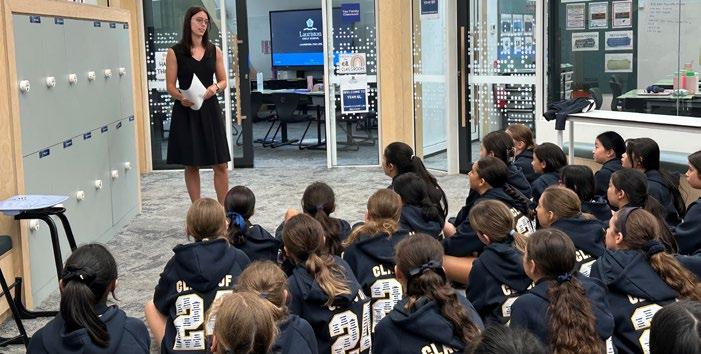
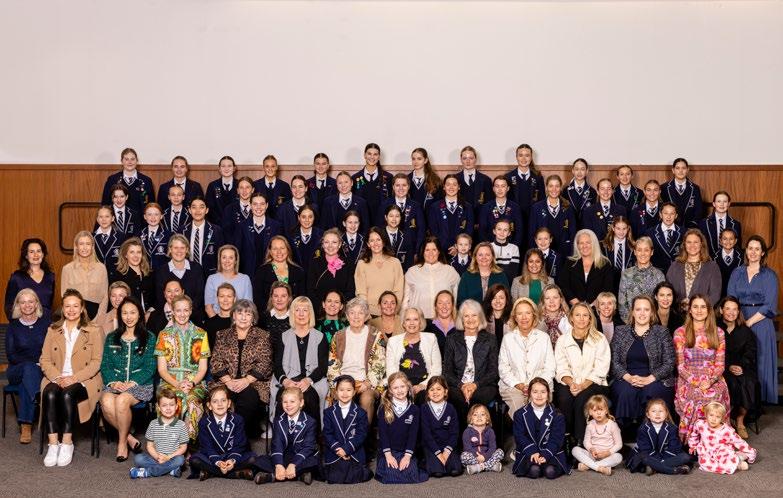
On Monday 13 May, we welcomed our students, whose mothers and grandmothers are Old Lauristonians, to commemorate an annual tradition – the Intergenerational Photo. This fun morning also included the opportunity for family portraits.
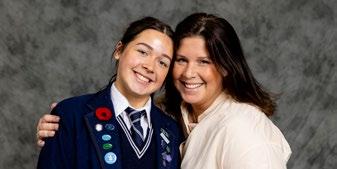
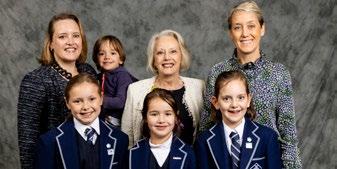
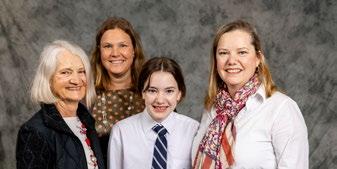
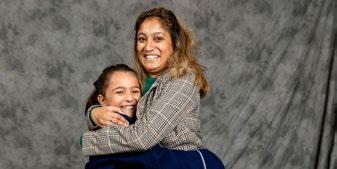
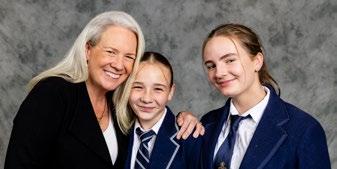
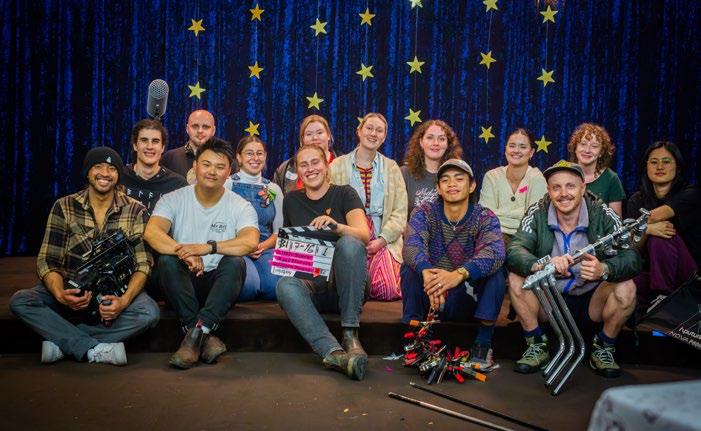
We are excited to share with our community an update about one of last year’s OLA Fellowship Recipients - Izzi Harris (OL 2016).
Izzi has been undertaking the filming of her new movie “Little Stars” and we are thrilled for her that filming wrapped up in December. Izzi explains that it was a very exciting few months! After four weeks of auditions, two weeks of rehearsals and four days of filming, the crew managed to get everything together for a hectic whirlwind of a shoot.
Izzi wanted to express her thanks to the OLA for the support - she tells us that she wouldn’t have been able to make this film the way it deserved without the support of the OLA Fellowship, and what made it even more special was including some Lauriston students and alumnae on set! “It felt like a very lovely full-circle moment for me, personally.”

The Old Lauristonians’ Association (OLA) has established a Fellowship program to support the professional development of Lauriston alumnae.
In line with the OLA vision and mission, the Fellowship program will provide a financial contribution of $5,000 to the successful applicant.
This Fellowship is to be used to support professional development, to help deliver a unique project, research or further study undertaken by an OL in her related field. Applications for the 2024 OLA Fellowship are now open.
For all terms and conditions and key selection criteria and/or to submit your application, please scan the QR code or go to ola.org.au/fellowship
Applications will close at 5:00pm on Thursday 15 August 2024. The successful candidate will be advised on 30 September 2024.
For more information, please enquire with ola@lauriston.vic.edu.au.
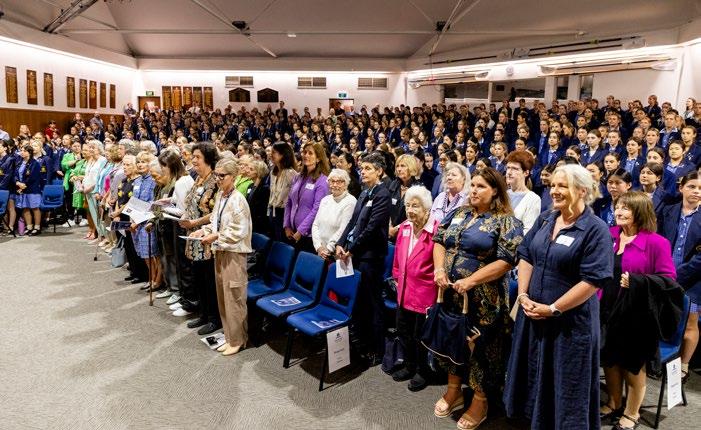
On Monday 5 February, Lauriston hosted a memorable Founders’ Day Assembly in Irving Hall, gathering our Senior School together with a fantastic group of 40 guests and alumnae. Irving Hall was filled to the brim.
Recent OLA Fellowship Recipient Binny Langler (Lang, OL 1991) graced us with her inspiring presence as the guest speaker, sharing valuable insights about never turning our backs on the opportunities that come our way. Her words resonated deeply with everyone, leaving a lasting impact.
Freya Albrecht (OL 2023), one of the VCE Duces of 2023, took the stage to share her remarkable journey through the final year. With hard work, determination, and a fabulous sense of humour, she achieved significant milestones.
The Old Lauristonians in the audience were treated to delightful musical performances, adding a touch of nostalgia and joy to the event.
Before the assembly, our cherished Old Lauristonians gathered for a light lunch, enjoying each others company, and rekindling precious connections.
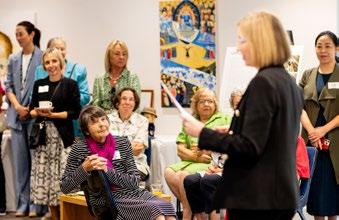
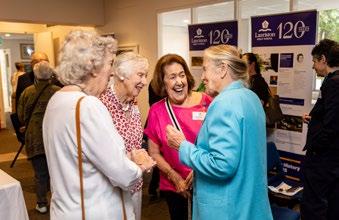
On Friday 1 March, we held the first reunion of the year!
The Class of 2019 returned to celebrate their 5 Year Reunion, that started with a gathering to explore the newly renovated facilities, including the transformed gym which now serves as the Year 5/6 Centre, and then onto a tour of the Ullmer Centre, which saw the rowers hop onto the ergs for a quick 2K sesh! That was after they had a go down the slide - high heels and all!
After their quick visit to the school, they headed to Harvie in Wattletree Road for a wonderful evening of beautiful canapes and grazing tables, drinks and an occasion which saw their fond connections deepen even further. What a fabulous group of Old Lauristonians!
Big thanks to Mr Smith, Ms Khan, and Ms Go who joined them for a catch up!
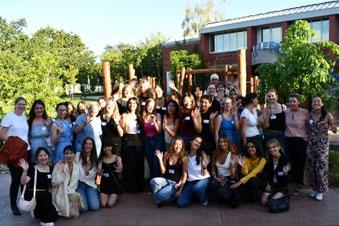
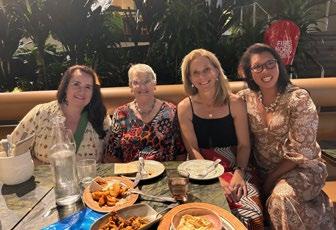
On Friday 22 March, the Class of 2014 returned to School to celebrate 10 years since graduating from Lauriston. We’re thrilled that many of these OLs continue to be regular visitors - over the years many have come back to speak to students and to be part of the Student Futures program at Lauriston, so it was no surprise they felt right at home as soon as they stepped through the Huntingtower gates!
What was noticeable though, was how completely delighted they were to catch up with each other - one member flew in from Darwin for the reunion, so it was a night of affectionate socialising and catching up on all the news!
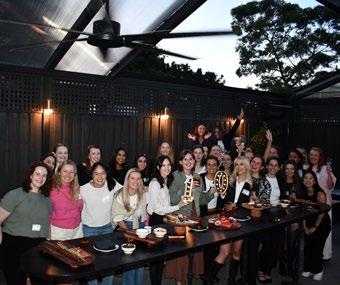
On Monday 18 March, we hosted an intimate gathering of Old Lauristonians in Brisbane. We met up with Amanda Gore (OL 1989), Jann Macrae (Breidahl, OL 1964). Dani Oaten (OL 1990), and Vivienne Stefanutti (Heng, OL 1992). None of them knew each other were coming along, so it was incredible to find out that Dani’s mum Diana Oaten (Lux, OL 1964) was at School with Jann, and that one of Vivienne’s very dear friends is Dani’s sister Marni Oaten (OL 1992). We missed seeing others who were unable to make it but were thrilled to know that there is definitely a growing need for OLs to connect, wherever they are in the world!
On Friday 19 April, we had a record-breaking number of alumnae return to celebrate their 20 Year Reunion! You outdid yourselves Class of 2004! A reunion at School with a tour and refreshments, and then a party celebration at Harvie in Armadale!
Even though 20 years have passed since they last walked through the Huntingtower Gates as a cohort, the bond among these women remain as strong as ever. As they gathered at Harvie, laughter and nostalgia were rife!
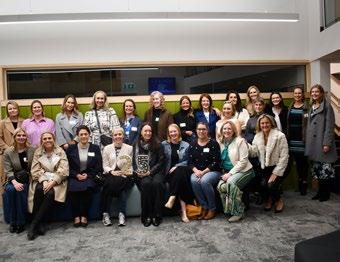
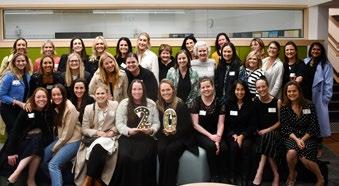
We were thrilled to welcome back Class of 1999 to School for a fabulous tour of some of the spectacular new buildings and facilities that our current students are enjoying. Some of these Old Lauristonians hadn’t been back in 25 years, so it was beautiful to watch their faces as they marveled at the improvements. Afterwards they continued their reunion at Harvie in Armadale, reveling in each other’s company and catching up on life news. Everyone was overwhelmed with happiness that Anica Gedge (OL 2008) also attended in honour of her darling sister Lydia, who was tragically killed on New Year’s Day 2000, just a month after graduating from Lauriston. We acknowledged a prize that is awarded to a student at Valedictory each year, which continues Lydia’s legacy. It was a beautiful evening bursting with #laurilove!
Monday 9 September Perth Chapter Reunion
Sunday 13 October 10 Year Howqua Reunion for Class of 2017 Howqua Campus
Thursday 24 October Lauriston Luncheon, including 50 Year Reunion for Class of 1974, 55 Year Reunion for 1969, 60 Year Reunion for 1964, 65 Year Reunion for 1959, 70 Year Reunion for 1954, and 75 Year Reunion for 1949.
Kooyong Lawn Tennis Club
Friday
Friday
Year 5/6 Centre and then at Harvie, Armadale
Sunday 17 November Bellarine Peninsula Chapter Reunion
Monday 18 November OLA Golf Day Lonsdale Links, Point Lonsdale
Event details and dates are subject to change. For more and up to date
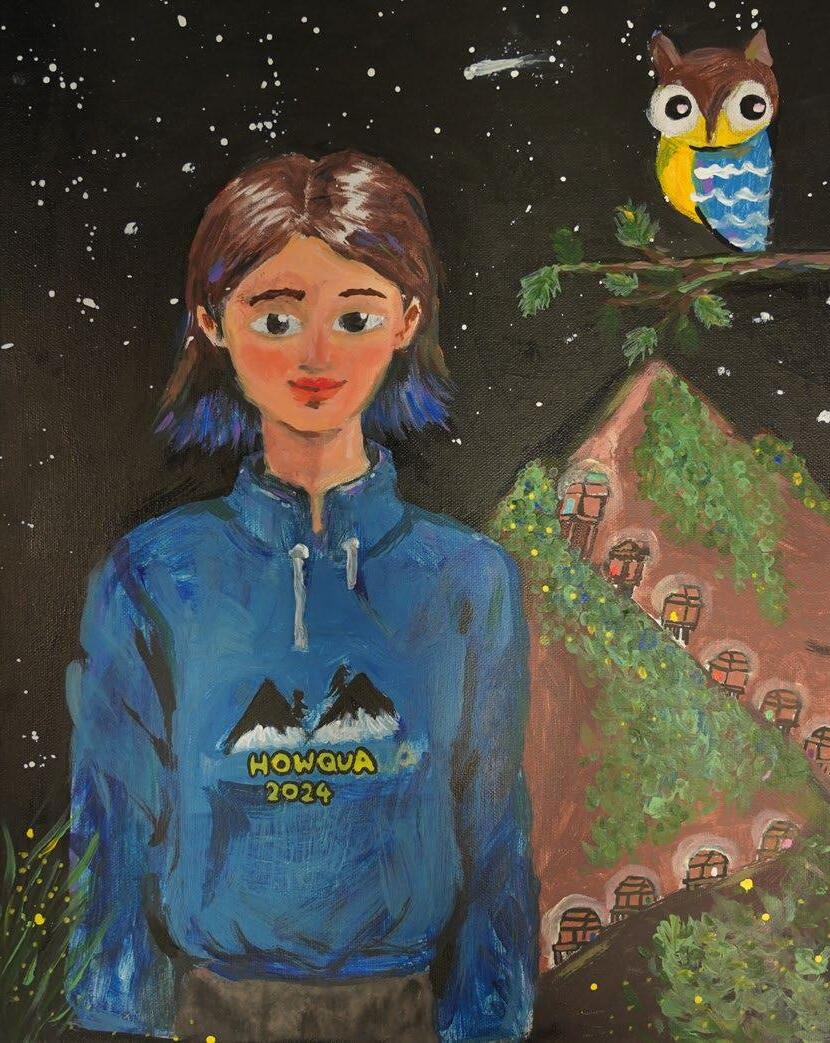
The Young Laurie Portrait Competition invites artists between 5 and 18 years old to submit a portrait of a person who is special to them, with over 40 entries received this year. Artist Lynn Song, Year 4, reflects, “My sister is really brave when she goes to Howqua, she doesn’t have any fears.”